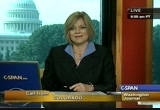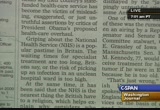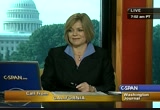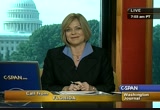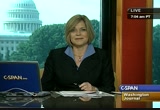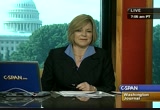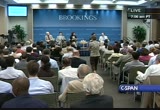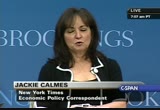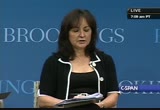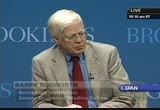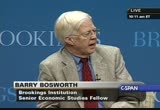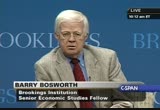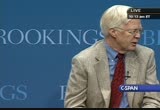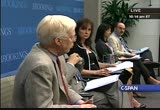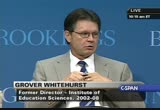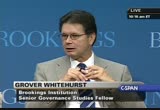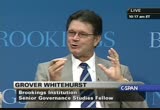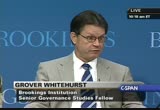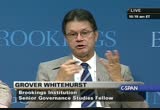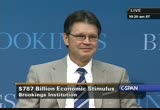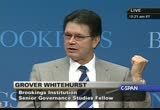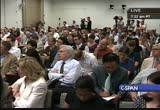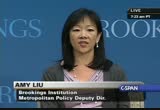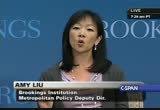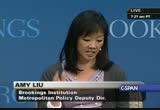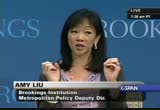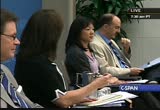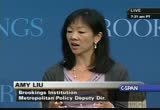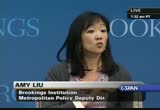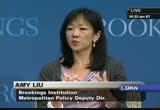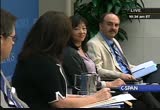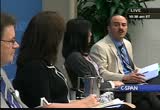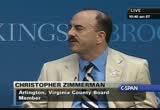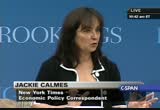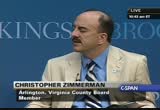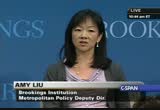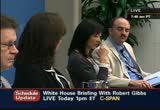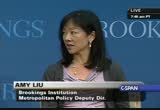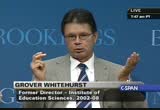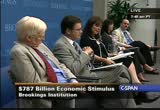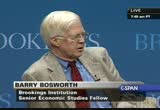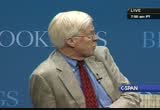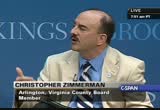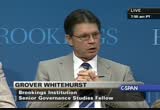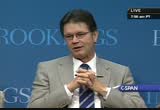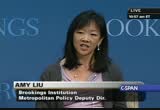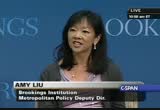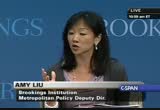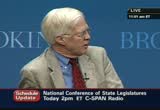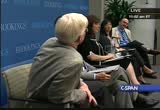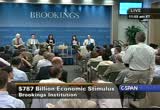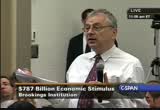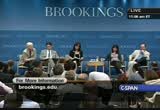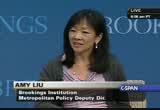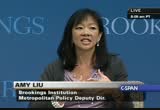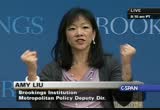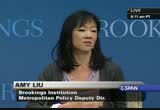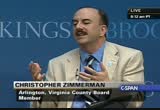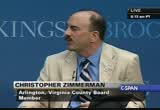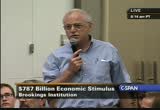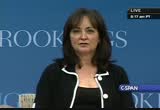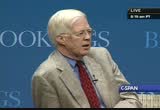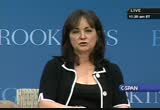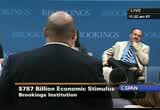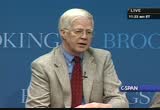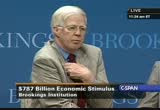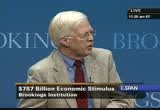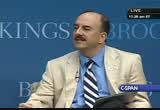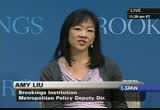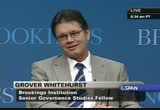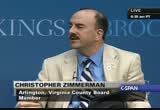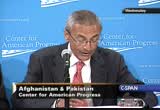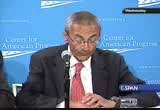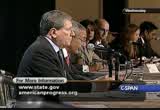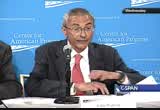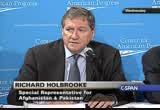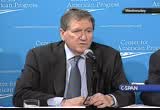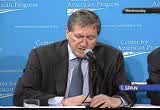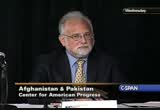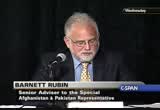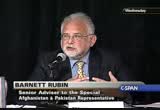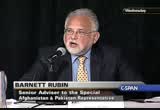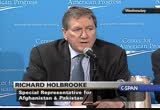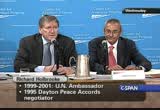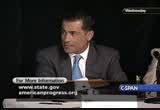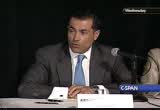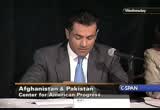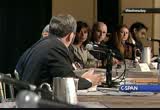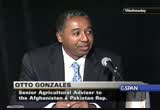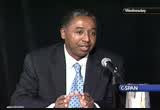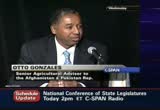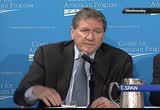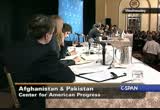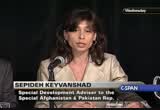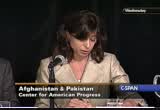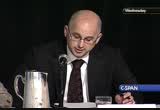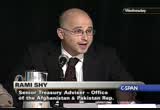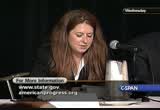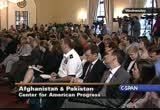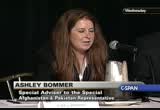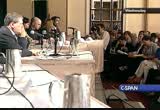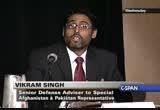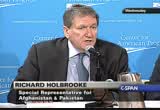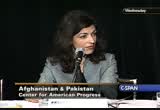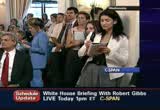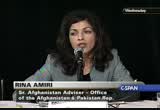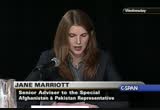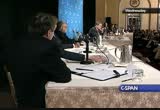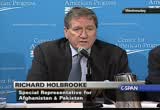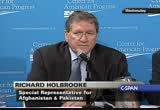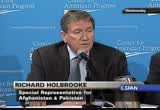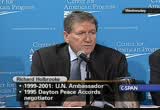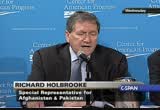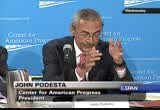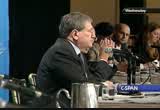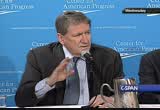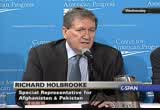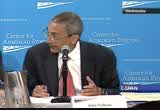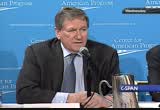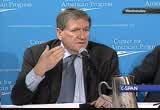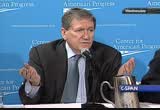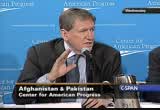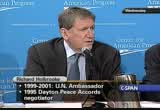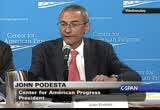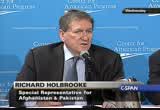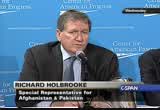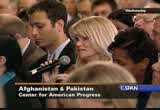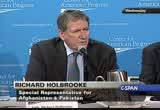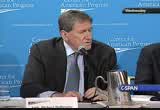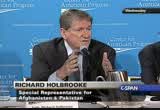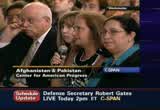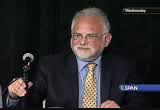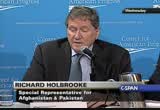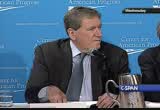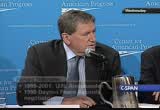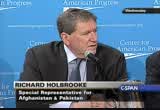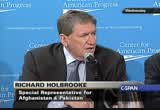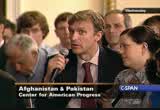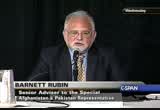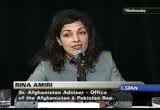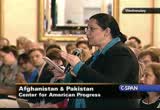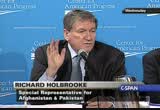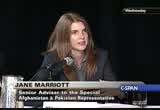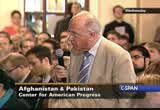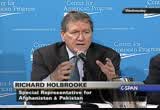tv U.S. House of Representatives CSPAN August 13, 2009 10:00am-12:59pm EDT
10:00 am
parties to oversee each other. that is what the founding fathers wanted. it was all about we, the people -- not we, the politicians or we, the aristocracy of. the only reason they did not call it a socialistic plan was because the word did not exist back them. please pick up the dictionary and history books and read about the formation of our country. we are trying to help people. democrats may not be run by the smartest people, but they are trying to help people. i did not like republicans any more than democrats. the businesses and rich people are doing fine. they do not need our bailouts. we need to save the american middle-class. that is the only thing too big to fail. host: thanks for your years of watching.
10:01 am
10:02 am
>> i made socially moderate fiscal conservative. we need to go to the supreme court with the issue of treating illegals. there was a local court that has not been challenged at the supreme court. we are burdened with illegals in california. in the walnut creek paper, there was a picture of a mom in the emergency room who had nine children. that is not my american birthright to have to take care of her nine children. i think we have to take it to the supreme court because a panel of three judges said to treat anybody that walks up to
10:03 am
our hospital. that is a burden for me that i resent, big time. that is not our founders intended for us to do. our final comment comes from a democrat. host: you get the last comment. caller: i hope i make it good. we have a $10,000 deductible so when they include me and my fiancee and that 85% of people who are supposedly happy with their insurance, we are not happy. me and my friends are in similar situations. the plans are out there. you might pay $100 per month or $400 per month to get more coverage. i think the national health plan
10:04 am
would help keep the insurance companies in check. we don't have any=t( american gs company that keep gas prices in check and look what happened. they had their chance to make a lot of money. i think it is time to put something in place and not this patchwork way of doing things i would like to tell you a story about my dad -- you recently went to spain, slipped and fell and as a result had to go to the doctor. he went to the doctor and pharmacist. when he went to pay, they said you don't have to pay here. he is an american. he did not understand. we have to pay in the united states and he is not spanish. they said we do did things differently. they run as a business and here we run for people.
10:05 am
if that is socialism, bring it on. it is too much because the costs have gone way out of control. we have no competition for these companies. i really resent all these right- wing people who keep making these assertions and shouting down people when we are trying to find information. if this is the christian right or conservative right, then where are their value is about taking care of 50 million people who need insurance and the millions more who are underinsured? host: thank you for being with us and thanks to all your messages. we will be back for 7:00 eastern time tomorrow. we will now take to the brookings institution in washington, d.c. think tank. they have a panel session this morning called "stimulus at six months, boom or bust."
10:06 am
10:07 am
there has been many times over the years when i have set out there with you all. it is really fun to be appear for a change. the kind to us. we are here to talk about the stimulus. the title of the program says it all. at six months has it been a boom or bust for summer in the middle? i am jackie calmes. i'm the national correspondent at "the new york times." i one-year anniversary was this week. -- mike one-year anniversary was this week. -- my one-year anniversary was this week. i will mostly ask questions and do what i do as a reporter. i was happy to be asked to be on stage with these people.
10:08 am
barrie bosworth, as many of you know, is going to give us the macro view of how the stimulus has worked. he has been a senior fellow here in the economic studies program at brookings. amy liu is an expert on the metropolitan areas of this country. sheba tell us -- she will tell us in a huge country, how well this is working or not working. given how uneven the recovery is right now. amy is the deputy director and co-founder of the metropolitan policy program here. russ whitehurst, sitting next to me is a senior fellow and the incoming director of the brown center on education policy at the brookings institution. he has held a number of
10:09 am
positions in the department of education during the bush administration. chris zimmerman will give us a particularly real life you of how the stimulus has been working. he is an arlington county board member and has been a resident of arlington county for 30 years. i will start out by asking questions of each of them. you can look over your papers and it might raise some of your own questions. they will have some discussion and about 11:00, i will open it to some questions from some of you, which i will be interested to get and take notes on. cspan is covering this, as some of you might know. when you have questions, let's get to the point because there are a lot of people that have questions. it is my prerogative to get the first one. that, i was interested in asking barry to give us the
10:10 am
broadview. in light of this week in particular and in the past two weeks, we have seen some positive signs of recovery or at least a levelling out, as the federal reserve said yesterday, of what has been called the great recession. to what extent are those positive signs due to the stimulus, the $787 billion stimulus plan? >> the good news is that the recession is coming to an end. the bad news is, as usual, government policy has not had too much to do with it. the problem with the stimulus program has been that it has taken too long to get it going. the crisis hit in mid-september. congress never acted on till the spring. it takes a couple of months for the government agencies to get it set up. most of the money is going to be spent in the future. it will be a big plus in driving
10:11 am
us out of the recession. in the recovery, we will see that it is a major factor for the united states. it is now going, pretty well. if you look at the downturn, there is one area where the program did works surprisingly well. that is if you are looking at the flow of income, disposable income, to households in the u.s. disposable income was dropping by an annual rate of half a trillion dollars. that is a huge reduction in household income through july. all of that decline has been completely offset by government transfer payments and tax cuts. that is a pretty amazing accomplishment. disposable income during the worst of this time has been rising. government did not do a lot in that area. unfortunately, consumers have been traumatized by the loss of their wealth which has not been
10:12 am
restored. they are not spending, despite the fact that disposable income has held up pretty well. if you look at the procurement programs, they are starting to get going free the money has flowed through to the states. many of you travel over the next month, you will see an extraordinary number of re- paving projects going on. in the fall, there will be a big kick to local schools that otherwise would have had to make cutbacks for that money will come through. most of the money is still in the future, yet. do not give up on it but what is disappointing is recession after a recession, the same thing happens. we cannot get the political process to act fast enough. it does not have a significant effect on the downturn face. >> given the depth of the recession, this package was designed, many people forget, as
10:13 am
a two-year plan, a time-release capsules. was this recession different in that you are right to be skeptical because of the political process but in this case the bad news is the recession was so bad and the good news is for once, the stimulus can be helpfçx(lc@&c+ >> you can always say the good news is that we got some positive things that a bus. this is the worst downturn the united states has experienced since the great depression. we knew it was coming. it was well-predicted way back last fall for it is disappointing that government cannot act quicker to step in and help during the downturn face. instead, we let it run its course. we then tried to rebuild after worse. >> are you able to say where we would be if there had never been a stimulus package? >> the most telling thing to
10:14 am
help on the government side is that decline of disposable income that i mentioned would have been extraordinary and that would have been making the consumption situation even worse. i think, yes, you can say, but delayed spring and summer, but consumption situation has been better than it would have been. business investment, no, i don't think the government had any effect on it. i think that the reserve boss' efforts to stabilize the financial system have actually worked quite well. that does not have much to do with the stimulus, per se. >>russ, a lot of this money went to school districts. it also went for education. the administration much talk about that the most. do we know what is happening with that money at this point? how much of that -- what does it have to do with stimulus, many people ask me that.
10:15 am
>> those are good questions and my answer is a continuation of barry's answer. i checked with the u.s. department of education yesterday. the department has about $100 billion of the $115 billion in education that is in the stimulus bill to manage. as of yesterday, $13 billion of that, checks had been written of that. roughly come up 13% of what the department has to dole out has been sent out in checks to states and may be too lea's. very little of that money has been spent for anything. it is sitting there in the state's checking account awaiting spending presumably sometime over the next two years. if you are looking for examples of projects and activities that
10:16 am
began our work continued as a result of stimulus expenditure, you will have a great deal of trouble identifying. you might, if you went to the local level, find some people who talk about the plans they put in place and what they anticipate doing. they have not? we spent any money on anything if you go to recovery.gov, you can sort it out in a variety of ways and look by agency for projects around the country that have been funded by the stimulus on that site, i found five hits for education, totaling $25 billion. $12 million out the door and $25 million has been identified with project. the rest of it is waiting somewhere. part of the story is the story of the differences among states. the state stabilization fund is
10:17 am
half of this money and other big chunks are for title 1, which is money for education for the disadvantaged and money for idea, which is for students with disabilities. more than half of states have not taken a single penny from either of those big pots. other states like california have basically taken every penny that was available. it is interesting to me, some states have felt and convince the federal government that they needed the money and needed to have checks written to them now and others are still waiting. >> can you generalize about which of those states are? are the urban or rural? >> i did not immediately see a pattern except of course california jumped out at me. they desperately need the money.
10:18 am
i suppose they can't -- they want to get it and where they can. the story is not as negative as it seems from the presentation i have given. imagine you have a rich uncle who tells you -- >> we will call him uncle sam. >> you can call him uncle sam and he has guaranteed you a large pot of money on a certain date that will be available to you. it is not available now but it will be available next year or the year after. that is significant for me that it would expect my spending now. i would know that i do not need to work -- or about reserves and more. i could go into the red and i will be bailed out next year. that is what has happened here. i looked at maryland, as an example for it in january, the governor announced there would beñ mass layoffs across the state, including education funding which would be cut back to a level the state had not seen in three years.
10:19 am
if you go to the maryland website to day, you'll see that the governor has announced that the budget has been made whole and there is historically high levels of funding for education in the state. the accounting is the addition is + $1 billion which is generous in an economic downturn. i think one of the challenges going forward here is, what is the exit plan for this? if you have essentially doubled education funding over a two- year perios, how you turn that spigot off? are there people who are not planning on turning this off? is this a tuneup for the re- authorization of "no child left
10:20 am
behind?" >> when you said you felt like you had been-at the start, is it a point of criticism that so little has been spent of the education money or is it right to talk of this in terms of talking about education that the administration and congress describe this in terms of the three r's - rescue, recovery, and reinvestment? should we think of the education money is reinvested in the economy for the longer-term? >> the best way to think about the education of investment, most of it, $95 billion, is that averted the layoffs of school staff. the layoff of schools that would have affected the economy. the administration has been explicit about not wasting a crisis. they have certainly had a reform
10:21 am
agenda and tied into the stimulus bill. it is interesting how the farm -- have the secretary of education has been able to get, based on the $5 billion that congress gave him, to dole out, in a competitive fashion to states, the terms for the competitions have not been set yet. the secretary has already managed to generate changes in state policy by telling states that they will not succeed in competing for these funds if they have artificial caps on the entry of charter schools into the market. or, if they have not signed up with the national governors' association and the part of the development of common standards or if they do not like individual identifiers for teachers to student achievement data so that it in the top --
10:22 am
bacon the sea in which teachers are doing the best job. governors and legislatures have been saying they need to act so that will market this month. it is an interesting indication of how you can get reform by the promise of incentives. in this case, relatively small portion of the stimulus package but $5 billion is a lot of money in absolute terms of state competition. >> amy liu, this recession was unusual in that no part of the country was there. -- wasspared. >.the recovery is uneven. why is that and to what extent is the stimulus package exacerbating that? >> i remember reading recently this past week that people have called the recession a statistician's dream. i will drop more statistics.
10:23 am
hidden underneath all the national statistics, we have heard about the recovery that it is highly uneven around the country. what we have done is launched something called the metro monitor which tracks the recovery of the 100 largest metro areas since the recession began. we did this because we have to remind our leaders that the u.s. economy is made up of a network of metropolitan economy spurted -- economies. it is based on how well toledo, detroit, las vegas, youngstown, orlando, would rebound and shift to the next economy. we focused on the 100 because the 100 largest metropolitan areas generate 75% of the nation's gdp. this is the economic engine of the country in to ask how well these areas of the country are doing. this is where people work and
10:24 am
live and employers reside. let me give you some statistics of the first quarter of this past year. the second quarter numbers have just come out and we are looking at that now. in the first quarter, the u.s. unemployment rate at the end of the first quarter, march 2009, was to enter%. if you look across the top 100 metropolitan areas, it range from as low as 5.1% in provo, utah, to as high as 17.5% in modesto, california where they have been hard hit. if you look at home prices, which has been important to real estate values, property revenues at the state and local levels, and for other important indicators, home prices, at the national level, had dropped 6.3% over the past year in the first quarter of 2009. if you look across the top 100 metropolitan areas, home prices dropped as severely as 30% in
10:25 am
one year in stockton, california. that was also in las vegas. we have heard about the pow the foreclosure crisis has rocked places like florida, california, arizona and we see it play out in many ways. the home prices actually increased in some parts of the country and rose by 4.7% in a houston and some places in upstate new york. this is a highly uneven recovery. what are takeaway is is that broad based fiscal measures, stimulus measures, may not be enough. at the end of the day, they are important and i think we have heard from the others about how they are important but we will meet probably more targeted interventions or ensure that the existing discretionary parts of the stimulus funds are flexible enough for local and regional
10:26 am
leaders to bend the money to address their unique circumstances. that is how a detroit and the central valley, california will have to think. they know best how they will get out of this recovery and focus on long-term sustainability. how well does the stimulus package structure to do that? we need to remind everybody that of the $787 billion stimulus package, 2/3 of that is dedicated to the quick-spend stuff. the stabilization to states, the tax counts, to help families with extended unemployment. those were needed and were quick-spending. they really did stave off some of the layoffs and budget cuts we have heard about. it is the 1/3 above budget in the stimulus which has got most
10:27 am
of the attention that matters for the flexibility to deal with the unique circumstances across the country. these are the infrastructure highway spending we have been hearing about, health and the green investments. how well are those dollars structure? this is a mixed bag if you talk to the local and regional leaders, there is a lot of the traditional funds like highway money that everyone has talked about. highway repairs are safe investments and needed to be done. most folks at the local level have said that they need to spend the money and not do anything stupid. we have heard jill biden say not to do anything stupid with the funds. -- jill biden. -- joe biden. where is the part of the package that are focused on the transformative investments?
10:28 am
at the local and regional level, this part of the stimulus package is what is generating the most game-changing initiatives and efforts to undercut the recovery. these are the things that will have a big multiplier effect and have long-term value. i would tell you that most local and regional leaders know they need to spend the money quickly and they need to focus on job growth. they do not want to take this money and create a short-term quick jumper they want to create a job that will last and create lasting industries. they want to have long-term prosperity. twhat are those programs in te stimulus package that do that? there is a lot of talk about the $1.5 billion in tiger grants which supports modal transportation like public transportation and housing. the money for high-speed rail,
10:29 am
the first time this country will invest in a high-speed rail infrastructure, $8 billion. there is a slew of investments that this administration has been brought up on the green side, whether it is energy- efficient homes, whether is asian, energy-efficient initiatives that we are seeing happening around the country. the next-generation infrastructure. it is not just the traditional roads and signs we see what we're driving around the country. it is the help i t systems, the smart grid. those are the kind of things that people are looking at. there's also the neighborhood stabilization fund which is coming out of hud to help whole neighborhoods deal with high foreclosures in their neighborhoods. when you look at those opportunities, many of the funds
10:30 am
i talked about are not even out yet. the impact is still to come. we are at the beginning of a two-year package. i think there will be a lot more catalytic things we will see coming down the pike. >> use unconditionally or tentatively optimistic that the reinvestment part will not just the political rhetoric, that there is something in here to give a push to bring jobs. >> we have to remind ourselves that this package had 350 separate spending and tax provisions. there'll be something that
10:31 am
someone does not like. there'll be something that people will like about it. people tend to criticism. it people's zero in on one or two programs that might attract that criticism -- the optimism for me and the local regional leaders and chris will talk a little about this, the one bright light in the stimulus package is that it created an opening for some really transformed the efforts. -- transformative efforts. there have been holistic solutions. at the beginning of the stimulus package, we only heard that states and jurisdictions would beget -- put together their wish lists. what projects to they want? the most innovative efforts around the country are not projects-itis but when they
10:32 am
think about transformative efforts. but one example is in the city of chicago where they have taken one of the energy conversation grants and scaled up an energy- efficient retrofit program for targeting multi-family apartments in the private market aimed at low-income renters. that is the one part of the segment that is not -- that is often overlooked when it comes to energy efficiency. there's a weather is asian program that is focused on single-family homes but they are doing this with private sector partners. in fact, the whole thing is almost all private sector oriented. the entire goal was to have scale.
10:33 am
most folks know about the funding will and. they are trying to figure of how to find private sector capital. they want to extend the value and take over these programs. this is what chicago has done. it has a lasting impact. in kansas city, they have done some completely different, not going after one project fund but there's a regional council of governments there, taking an unprecedented role of working with a bunch of the neighborhood associations and other collaborators to basically channel 15 different stimulus funds into one, low-income neighborhood off of downtown in kansas city. it is a 150-block neighborhood. they will make sure that if they will have impact, they want to make sure that one part of their community will have maximum
10:34 am
impact. i think that is the kind of creativity we are seeing around the country that the stimulus is seeding in some places. >> you anticipated my next question about your favorite examples. we will turn to chris zimmerman who can give us a localized to view in arlington county, just over the river in northern virginia. what is your view on this? >> if you ask the question, did stimulus help or is helping? if i'm given the choice between what is happening and not having passed the stimulus bill at all, unequivocal, i am grateful that the bill passed. there is no question that our world would be more difficult right now if that bill had not passed. at the same time, from our
10:35 am
perspective, it was not enough. if you look at the impact on state and local budgets and the simple fact that the budget caps that were generated by the recession at the state and local levels were enormous and the amount of funding provided through this was a fraction. in rough terms, there is a $50 billion state stabilization fund but the budget caps at the beginning of the year were about $200 billion. you are not talking got a great bounty. you are talking about minimizing the impact of cuts and tax increases that would have taken place at the state level. at the local level, there was not very much. there is in very much money that goes directly to local governments. we benefit indirectly from monday that the state's debt. -- money that the state's debt. -- get. there is very little that
10:36 am
actually will come to a local level. for the most part, in my county, we have yet to receive a dollar. that is not entirely a terrible thing. if we have not received the dollar but we will receive directly about $9 million. in a county with a $1 billion budget, that is not a huge amount. it is not that it will not be helpful. people are working today in our county who might not because of the money we know will come. we're not gonna check if that is okay, things are happening. the fact of the check has not arrived does not mean that it is not working. because you know the check will arrive, it affects people who are employed. it is true that it had a limited ability to help us with our budget debacle to this past spring for some of the reasons that mr. bosworth said bret it takes too long to get going and it is too small.
10:37 am
it is not too flexible, especially at the local level. that is a bigger problem when people are willing to pay you to buy buses but not to pay bus drivers, you can be in a situation where people are laying off bus drivers and a half an offer to buy buses and what do you do with that? that is multiplied overall. i don't think this was the optimal way to provide stimulus and offset the recession of state and local fiscal actions that are cyclical. we to exactly the wrong thing when we are raising our taxes and cutting our spending in a recession. on the other hand, a lot of it is happening. the most significant impact may be long-term, which is outside the range of stimulus. some of the money that is in here, not even the larger amount, will have a positive effect. for instance, i should have mentioned, i am on the metro board and the washington area and we are getting too good
10:38 am
million dollars in investment funds that we desperately need for capital. we had $500 million and we are getting $200 million. we are cutting our capital budget by $150 million so it offset what would have been a huge cut. that is important on a regional level. >> that is money that goes in the entire washington area? >> it goes to the transit system here and benefits the entire region. our transit system needs a lot more investment, $11 billion over the next decade when the funds have been declining, not increasing. that is very welcome. the kind of thing that might have an impact long-term that amy was referring to, like the tiger brands is something we are working on now on a regional level. we have been working on an application for some of that money and it is a competitive grant. the region will try to compete to get one of those that will involve a region-wide bus system
10:39 am
that will integrate intermodal a with a rail and a bicycle and that will involve all the jurisdictions and all levels of government. it has forced us to bring together the state highway departments in virginia, maryland, and the district, the local transit agency, the local governments of all the jurisdictions and we have been sitting at the table for the last six months trying to hammer something out. the very fact we are doing that is a good fit -- thing with long-term benefits for the region. if we get the grant, that will stimulate more that we can make investment in in years to come. there is a lot of balls of the camp and out of desperate at the moment, there is a limited number of dollars that is being felt a local level. >> if you could do it all over, what would you advise congress and the administration? >> my view personally is that if you want to get money out of a rate -- money out in a hurry, which is the point, a lot of
10:40 am
this was tax cuts and they are inefficient. a lot of it is capital-type programs which the company needs to do more of but from a stimulus standpoint it's a long time. i always felt that the best way to go about this would of been a counter-cyclical revenue-sharing program. the most important thing that would have had the biggest effect is to have 50 states and local governments not cutting their budgets and not raising their taxes. that would have an instant a factor when you provide that money. when they are doing their budget in the spring, they are already cutting back in anticipation of the bad year that is coming. they are already holding things up. peeper -- people are already losing their jobs. if, by formula, you distributed funds that would offset that, people would know that is not what is happening in their budget and you would have much more impact.
10:41 am
i think this is relevant because the other part is that the recession is not over as far as state and local governments are concerned. suppose it turns out that this is the bottom and we are moving up? next year, state and local governments will have a bad year, probably worse than last year. that is true, even if we are in recovery. we don't even know that yet. in local government, we are heavily dependent on property tax. our debt is by far the biggest. real-estate dahlias will not recover in any big hurry. if you look at the last recession, the one in the early 1990's, the recession was over in march of 1992. there were several years before you saw that showing up in real estate assessments. at best, we are looking at one more really bad year at the
10:42 am
state and local level, in terms of doing budgets. last year was hard in this year will be harder. >> is there anything that anyone said that some other panelists would like to address before a monopolize conversation again? you referred a couple of times to things that barry had said. i want us to continue talking about what this stimulus package has done before raise the question of whether there is a step in stimulus on the horizon. since you make -- a second symbols on the horizon. i have watched state and local governments, especially at the beginning of this decade when we had a recession and there were hit hard. as they start doing their budgets later this year for next year, will there be a need for a second stimulus from the standpoint of the state and
10:43 am
local governments? >> i certainly think it would be very helpful at our level. i think people need to understand that no matter what they are hearing about what is happening in the economy, and i hope it is positive that we will pull out of this, that that will not have a bearing much impact on the very next budget, which is being written right now and all governments. it will be in the news early next year. most governments are working on a july-june fiscal year. most of them adopt in the spring. you should anticipate that we had a tough budget year and will have a tougher one ahead. we will be receiving some of the dollars we are talking about from the existing stimulus. they will kick in in the fall when people start drawing down. that is not necessarily impacting the budget decisions that you have to make for next year. >> i want to elaborate on that. i do think that this is the one thing that was overlooked in the stimulus package.
10:44 am
we can talk about whether their knees to be a second stimulus to address this. we have been working with our colleagues at the national league of cities and others talking about the fact that this is another sleeper issue. there has been a lot of studies done on state fiscal crises and their anticipated deficits which is true. what is harder to quantify is all the municipality deficits, all the local budget situations around the country. what is fascinating to me is that local governments, on average, 15% of their budgets are dependent on state aid. if the states are cutting back, they will feel the pain. local municipalities are highly dependent upon property tax revenues and sales taxes to pay for staffing and services and all the capital needs. transportation funds do not take care road repairs and other
10:45 am
things like parts and services that will get at local level. with consumer spending anticipated to be down for a long time, the home real estate prices are expected be down for a long time, this next year, the members are expecting that for the first time, property tax receipts are dropping for the first one in 10 years across municipalities. collections are dropping because of the revenues. there is a two-year lag because of the way they do their property assessments. historically, if this year was the worst of the recession, don't be surprised that all lowest point of a local budget will be two-years later. i think that is why you will still hear about the fall out and the lack of this economy in 2010 and 2011. many of us live and localities
10:46 am
and we feel the pain when our local governments start to cut back and raise taxes. what the options for that? some of it could be whether we think about a second stimulus package or a recapture of existing funds to do a revenue sharing with localities. we have done this before. it is not that hard to do. the second is the bond market. most states but also localities rely on borrowing at this time. the ability to access credit and the??é ability to address bondig authority, municipal bonds, those are weak markets. this is an opportunity for the administration to think about how treasury can work with wall street to resolve that for all local governments. there are other options but i think this is one of those overlooked pieces of the stimulus puzzle. >> if i could end to that -- implicit in this conversation,
10:47 am
at least as i hear it, is that while the private sector has to shrink and circumstances in which revenue has decreased, the public sector will always be made whole. there is fat in schools and state and local government. i think we need to differentiate a package that is designed to shorten the recession. it has to represent a permanent flow of federal funds to support local activities and to make them free of the necessary -- necessity to adjust in the context of a recession. i don't know where that line is. we need to remember that we have a very large structural federal deficit. to talk about simply dealing with the needs of two-years of
10:48 am
mass appellate days and transferring funds from the federal government, shifts the problem from one location to another. >> you could say that this ties into the health-care debate, given the portion of state budgets that as medicaid -- that is medicaid, to the extent that has increased through any health care reform will add to the problems during to the extent that there is any second stimulus package in the next year or two, even if it is only targeted to state and local aid will depend a lot on how people assess how this stimulus has done. i hate to do this. given that the title of this program is called "stimulus, boom or bust," i want everyone to take this choice and come down somewhere.
10:49 am
barry? boom or bust? >> to say is a bust is too harsh. it is very disappointing when the original objective was to try to stimulate the u.s. economy. the whole focus shifts toward long-term measures. we would like some investment help on this and that. we are really getting away from the subject of stimulus and trying to turn around the recession were the usual focus is how to get the money out fastest and into the hands of people who will spend it. i am in favor of increased infrastructure and investments. the notion that there is a shovel-ready projects was a mess than we are now seeing that. it took a long time to get these things started and we are left with re-paving roads. next year is too late to be submitted this. what happens in these sorts of
10:50 am
proposals this individual interest groups come in and use it -- what was the phrase that somebody had? never waste a crisis. that is what happened. that is the worst possible thing, from my perspective because you end up using the crisis for other agendas. that is what is happening to this and it will be more severe in a second stimulus that was in the first. what you want an argument? -- >> you want an argument? i think that is really overstating it. number one, i think the statement about road paving -- i would note that paving roads is one of the things that gets cut first. if it is just paving roads, it is drastically cut back everywhere when you run into economic trouble. most places have not been paving roads and up. the fact that was available and the stimulus funds were used for
10:51 am
it is probably a good thing and was something that needed to be done and does represent immediate stimulus. the $200 million that metro is getting is important spending that is a shovel-ready. these are things that people are ready to do. these things are also being used for buying buses. in our county, we are ordering buses that we wouldn't have normally order. they are employing people who are building and now. the fact that they have a long- term payoff is a good thing. my overall target in stimulus is consistent with what you are hearing on the other side which is i argue for counter-cyclical revenue sharing so when the economy goes up it does not go away. does the right way to do from an economic standpoint. it is also true that the country has a huge deficit in infrastructure investment. in the short run, the most important thing to do is end the recession and get the economy back to potential gdp.
10:52 am
that will close the gap in the short run for in the long run, it is the productivity of the economy. i would argue that our economy has suffered because we have been rolling up deficits for the last few years and we have not invested in our common. even though this is a highly imperfect instrument, all the stuff that is being done may not agree for stimulus but they are things we need in this country to generate the economy that will take care of things like deficits and other expenditures that we need to be able to deal with in the future. >> the perfect statement is never wish to crisis. i agree. as a different issue -- that is a different issue. >> chris, boom or bust? >> i would not either of those supplies. whether it is a b + or b-, we have to wait to say.
10:53 am
we have to see how it plays out you have to evaluate the stimulus and was doing with government spending? most of what is being done in government spending is so desperately needed that even if it is not being done in the best way, all of it is so desperately needed and so small compared to the need, that that will be pretty good. as stimulus, from what you hear from mr. baba worst was saying -- mr. bosworth was saying, most of this is tax cuts. it offset in, and got into people's hands. when you add in the other things, there is a fair amount of it that was aid to people in need like unemployment. my county is getting $1.5 million that is helping in the service needs. we put our money into that because that is what is most needed at this time. clearly, we would be in a much
10:54 am
worse situation nationally and locally if we did not have it. it is not what i wanted or as much. it sure is a whole lot better than if they did not do it at all. >> the $1.5 million, is that part of the $9 million that you talked about earlier? >> about $5 million of this transportation. having had hundreds of millions of dollars in cuts in transportation, is $5 million that is going into things like buying buses. there's a couple of million that is on the energy efficiency programs and those are programs where things would have happened and been cut back but now things are being done. we also got some money that was for aid of various kinds that helps people most in need. it might be around $2 million. >> russ, boom or bust? >> i will give you a new ones. >> i thought you would. >> the state stabilization
10:55 am
investment was a reasonable line. it was about $50 billion that let states avoid substantial layoffs, gave them a fair amount of flexibility as to how they want to spend it, k-12 education and other needs. i would give that and a. the topping up of traditional entitlement programs so that you put more money into title one or idea, that is the run-up to increasing funding and the "no child left behind" re- authorization. i would give that a c or a d. on the reform agenda, the evidence is still out congress gave the secretary of education and unusual degree of flexibility in terms of dangling a lot of money in front of states with an agenda to be set by the secretary. you have to go back to lyndon
10:56 am
johnson to find a time where there was as much power centralized in washington with respect to education policy. they got some good ideas. we will have to see how it plays out over the long term. i think they have good ideas and have some concern about the degree of flexibility that has been provided. i would rather have seen that worked out of the congressional process where people have an opportunity to opine on whether they want states to have or have not charter schools or national standards, rather than have that as a decision that is made in the white house. >> amy? a boom or bust? >> this was a hodgepodge package and that is why we are getting hodgepodge results. i agree with everyone here that this is still too on even and to be determined.
10:57 am
what matters or what we can do now is that the 67% that went straight out of tax cuts and fiscal stabilization and unemployment benefits, that was fast. that was what most close talk about when they talk about fiscal stimulus. it was crafted well. people can argue about the size of them but that frustration is the 1/3, whether translation -- transportation is getting the money. when i saw christina romer's speech from the economic club last week she, she said of the $87 billion, $100 billion has been spent so far it $100 billion. we're still not there yet. that may not have as much of an effect on this economy. it is still to come.
10:58 am
the agencies are doing the best they can. people can quibble about the quality of the choices of the projects under dot but they are hitting their 50% spending targets at 120 days. the metropolitan planning organizations got directing funding -- direct funding for their transportation plans. they are on their way to that. those kind of deadlines in the bill were important and people are meeting the spending targets. on the other stuff that is discretionary, i think that rather than go to a second stimulus, many are talking about that if there is still $687 billion out there, let's make some reforms now to speed upper also improve the quality of the spending. let's mature the mess -- rest of
10:59 am
the money gets used and fast. most local people do want to do this best. they do not want to pour it into a place that has no market activity. the administration boasted weather is asian in -- weatherization in most state offices. it was 30 times the size of the program and wondered how to get the money out. the program is so cumbersome in the way the agency designed the process that is slow for localities to spend it and some folks are avoiding a completely so it is not getting spent. those of the kind of fixes that we can urge to be made to make sure the remaining funding gets out there and is done effectively. the other is broadbent very bad example where people have said that in the first amount of
11:00 am
money the king of the commerce department, the first round of the broadband money was so narrowly defined in the eligibility of on served areas that only remote, rural areas could qualify for this funding. yet, most business and private sector people who want broadband, think of it as an opportunity. they have a cable modem so they can boost a entrepreneurship and small businesses and connect workers to the system so they can find employment. we need to think about deploying this in a way that it has the kind of catalytic impact on the market so we can feel. itfeel so we can feel it. .
11:01 am
>> the level of where you otherwise would have been is completely hypothetical. no, i think it is unfortunate that we got into this question of new or saved. i don't think we can put a number out. the employment losses in this recession, by historical standards, were extraordinary. it has just been a terrible loss of jobs. the good news is, going forward, people will be surprised, on the basis of historical experience, how fast the recovery comes. in past recessions, the worse the decline, the faster the
11:02 am
expansion. i am not sure that will happen this time because we have continuing problems. but i think it is a waste to try to sort those two numbers out in any kind of detail. i am content that going forward, this stimulus has a lot of things in it that will create jobs. >> which makes it the perfect political promise, to create and save those jobs. >> a bit of a political gimmick. >> it is a time to open the floor to questions. they're people with microphones around. i will take two at times so that we can get as many questions in as possible. somebody will ask a question, and we will hold that thought and ask a second person, and then we will have whoever is best on the panel to answer in do so. sir, on the isle -- aisle, if
11:03 am
you could say your name and where you are from. >> we designed that chicago energy program. one of the things we learned in doing it is that it is possible to do better than things like this situation you describe with weatherization assistance program. my answer to your question -- the experiment may have been a success, even if some of the programs we are -- some of the programs are failing, but we are learning what works better than other things. i would be interested in comments on the latitude to do that quickly, so that we can caliber this midterm. does the federal government have what it needs to shift those priorities? my second comment is how important this was to income maintenance. the other half of this is that the cost of living is still a
11:04 am
pressure on people. things like energy efficiency and expanding transit service, a stabilizing or lowering the cost of living, and maybe that should be another kind of target, in addition to the economic targets. does anybody have a comment on that, lowering the cost of living as a priority? the belated one would be that when you said target, amy, you were talking about special targeting. we are finishing a report showing that the formula by which the transportation money actually went out was severely biased against urban and metropolitan areas. what do we do about that? that has been a traditional problem. they picked 1965 formula for public works and economic development act that just does not work for the way the economy has been working. do we need an uberpolicy from
11:05 am
the white house to pay attention to this? your basic premise is that the economy is in metro areas, but the basic formulas seem to direct money away from where the economy is. those are my questions. thank you. >> if you could summarize your bottom-line question their -- >> does the administration have the tools to make a mid term corrections? we have learned that some things work better than others. it is not one size fits all. if we need to cut our losses and make more of the money that is already in the authority that has been granted, does the administration have the flexibility to do that, or does congress need to do something else in a hurry to make that work? >> let's take a question from this side, from someone. this man here in the second row. tell us who you are and who you are with. >> free-lance correspondent.
11:06 am
from what i've heard, the basic problem is implementation. i was surprised to have heard from barry that business did not get effect. from now on, should put more money to the private, small business, because those sectors really increase employment. employment is the most basic thing of the recovery. amy talked about several things. you mentioned about the green economy. really, we don't have a green economy infrastructure. but one thing is this -- the solar. i was surprised, at the beginning of the year, that the solar industry is not interest
11:07 am
in putting a panel in this house. i think we should do that. you talked about broadband. i also tried to mention it. you talk about health reform. health i.t. is very important. u.s. is the only country that does not pay attention to it. furthermore, i want to say this -- from now on, you do anything, you have to listen to people like is a man at the county level. from now on, -- like zimmerman at the county level. most important, i keep at the size, you should take money from a particular bank to the small business. thank you. >> does anyone want to take the
11:08 am
first question about whether, as we revisit this, does the government have the tools that it needs to make these things more effective, a sort of best practices, and spread the word? >> well, i appreciate scott's, and questions. good to see you, scott. it comes back to your comment, too. this is about implementation. asbury said, government bureaucracy -- as barry said, government bureaucracy is not attuned to fast, flexible implementation. i will not spend a lot of time about all the problems that local and regional leaders are running into when it comes to this. but when scott asked is there a way to scale up or accelerate experimentation, i think that is
11:09 am
one of the desires by some of the agencies in the administration right now, that they are realizing -- they are forgetting that when they put out all this money, put out all these programs, 350 programs, it is the same number of applicants in a local region. they are all having to deal with 30 different reporting requirements, 30 different applications, different rules. they are trying to fuse binding together to have scale. even though they are trying to do this quickly, trying to do it creatively, quick and tactful, the federal rules make it very hard for them to do so. there are ideas that are out there on how to do that so that this experimentation, the innovations, become more the norm than just the exception to the rule. in terms of -- if i may comment
11:10 am
on the second question about -- you were mentioning broadband and technology -- one of the things about how government programs are so isolated and cumbersome is that some of the private sector leaders and local regional leaders that we are running to are so excited about health i.t., broadband, and the smart grid, but they are pulling their hair out because these are now three separate programs with three separate requirements, three separate applications, when setting up a broadband system, setting up an ability for a number of multiple hospitals and health clinics in the region to share documents electronically, and the ability to track and measure energy use in a home or commercial building, and use the same fiber-optic cable.
11:11 am
rather than apply three different times or cut up the same cable three different times, they want to streamline and do it all at once, and transformed it technological opportunity in their community. this is a kind of delay, if you will, that makes, even though the intent is there and the creativity and experimentation is there, it makes it really hard. there is opportunity for the government bureaucracy to be more responsive and flexible to meet the way people, local leaders, operate on the ground. >> i think amy's point cannot be stressed enough. with this package, for what are reasonable reasons, the attempt was to use existing programs doctors to deliver funds. there are good reasons to do that, because you have them in place and so on.
11:12 am
unfortunately, a large part of those systems, a large part of the government bureaucracy, as in recent years been aimed at keeping money from going out the door. a lot of those structures have not been implemented in ways that were intended to promote that did the work being done by people who did not believe in the purpose of them in the first place. the new administration is in the early stages still stuck with the old structures. that comes up in areas i work in, particularly transportation. what qualifies for shovel-ready? it really means procurement- ready. something you are actually ready to do. you have a whole system that has made it very difficult. if you did not have money in hand, you could not have it on the key list you have to be on to be eligible. if you do not have money, they are now giving you money, and you cannot spend it because you are not on that list. there is a fair amount of catch- 22 in all of this. until they change a lot of that,
11:13 am
especially in transportation, to where the intention is to promote the development of projects, using those mechanisms is necessarily going to be clumsy. that is very uneven across government programs. some parts of the bureaucracy are good at getting money out in a hurry. investment and infrastructure by the nature have all kinds of checks and balances, and those checks and balances take time. that is why i came back to my earlier point that if you want it in a hurry, you have to make it a general purpose, and restricted, let them appropriated, and then you'll get it out in a hurry. >> man in the blue shirt -- yeah, you. yes, you. >> i have been around this town and longtime, and i moved to track the medicaid money in the recovery act.
11:14 am
i am shocked that that word does not come up here, given that it is the largest spending program in the bill. perhaps that is because it does not say stimulus in the bill, or the medicaid title. it says it is for stabilization of state governments and for stabilization of the medicaid programs. given that we have maybe $87 billion for those purposes in the bill, compared perhaps to hundreds of billions or trillions of dollars for stabilization of our banking system, would you judge that structure and spending, of which may be a third has gone out so far, has to be f-? >> we will take a second question from the man in the third row -- for throwback. green shirt. >> georgetown university. mr. zimmerman has given us a set of reasons for the difficulty of
11:15 am
the program, but when we talk about the fragmentation, it geographically, so on, to what extent is this stimulus package complicated because it is the way the administration decided, to what extent is it because congress put things in, each of which served some constituency somewhere? >> is there someone who wants to take the medicaid question? it looks like it was directed at this side of the c-spa-- >> medicaid? >> you said you were from gao -- >> the question was the $87 billion estimated for medicaid, state stabilization, maintenance of the medicaid program. was that well done, poorly done? i'm just sort of shocked that it has not been brought. >> i don't have much.
11:16 am
>> it comes in the category of the income stabilization, so it has been referred to in generalities. >> again, most people, at the state level, medicare and medicaid is the biggest chunk of the state budget. i know there was talk about fat in state and local budgets, but a lot of the growth or cost of state and local budgets come from things that they cannot control, like health care costs and pensions and the rising prices of gasoline and other things. the increasing match in medicare and medicaid has been incredible physical relief for states at a time when health care costs and needs are rising. the demographics are increasing. it allows them to, in some ways, plugged those deficits and think about where they spend elsewhere. it was very important. >> the second question, to the
11:17 am
extent i understood it, was whether or not the program that we are describing is complicated by design, in part because it goes to the question of how much is parochial pork that might not have been the best thing to have in there. the claim is that it is a pork- free bill. but, you know, that goes back to the old saying that one man is worthy project is another woman's pork. who wants to take the question? i think it is a good one, because the public, so much of the public's in view of this is shaped by is it pork and is it not? that is an important one to address. >> you can argue about what is and what is not. i think the question was how much is framed in the executive in some comprehensive way, and how much of that is formed in
11:18 am
the legislative process? my impression certainly is that this was very much a congressional act, reflecting what was necessary to get 60 votes in the senate. that necessarily resulted in the character that it has. it is not anything -- that is the way it is designed. the executive branch will always have some limited ability to craft anything of that size without congressional interests coming into it. which i do not think is a bad thing, by the way, because that is the united states of america. >> the striking thing about the obama administration so far is that he apparently does not seem to be interested in crafting the initial version of anything. his health care program is basically left for congress to come up with a bill. the stimulus program basically originated in its structure on capitol hill. i am sure there is in formal input into the process by the
11:19 am
administration. but as compared to the past, when administration's proposed the program and then argued for their program, that is not the way this administration has worked. it is a congressionally initiated program, unnecessarily complex, because you have -- necessarily complex, because you have to satisfy many different interests. i would give it good marks for not getting into these individual congressmen getting something for their district. i think it was largely free of that, and that is a big plus. when you have such a big program, i think it makes sense to cover lots of different areas, make it differs -- diverse, because you cannot increase the scale of a single program to fast. >> as someone who covered it as it was taking shape in december, before the president had even taken the oath of office, you can talk about the health care
11:20 am
plan and whether he should or should not have had on more detailed blueprint, but the stimulus package was done in the interests of time, in terms of where the economy was at that time. secondly, in both examples of this stimulus and the health care bill, we are seeing that they are much more involved in congress than you would think by virtue of -- i think the stimulus bill in particular, to stick to the subject, was much more shade down to details in the white house -- shape to down to details in the white house that has been reported, and i say that as a reporter. what is wrong with that picture? [laughter] >> when will you be reporting that? >> questions? the lady in the black shirt in the middle. if you could keep your questions short, we can get as many as
11:21 am
possible in the remaining 10 minutes or so. >> i'm a consulting anthropologist. much of this discussion has focused strictly on the domestic dimensions of the economy. i am wondering about the international ramifications for the dollar and for the economy in the future, and how this is perceived. there is a range of issues that i would -- i think the question is clear. thank you. >> keep it easy, right on the aisle here. >> i'm with the associated general contractors of america. obviously, our industry is probably more impacted right now during this recession than any other week have. approximately 19% unemployment right now. we are frankly very grateful that there was a strong infrastructure component in the legislation, although it could have been more significant. but we found recently by surveying member is -- members
11:22 am
is that stimulus projects -- they are putting it off in anticipation of a funding happening. we are working with agencies and hoping that in the fall we will see more projects coming out. right now it is a little bit disappointing in terms of what we are getting elsewhere. mr. zimmerman, what are you seeing in your local area? how was this impacting my daily life? how is it raising the issue of what the needs are locally in northern virginia as compared to -- we have a $600 billion of waste and water infrastructure over 20 years. local communities cannot pay for that. a lot of people say they want clean water. what are people telling you back home? >> i think the first question should go to you, on the broader impact of the stimulus bill, if any, for the global economy,
11:23 am
since the u.s. is obviously a huge player. >> the global dimensions of it is actually a big plus. it is amazing, i think, how cooperative countries are run the world have been. to be blunt, this is a united states mistake that screwed the whole world economy. rather than the rating us -- berating us -- >> you don't mean the stimulus? >> no, the crisis -- most of the world has responded very quickly. i am impressed by how many other countries -- china comes to mind -- very quickly stepping in with a large stimulus programs. the discussion at the g-20 level has been very effective in encouraging countries, let's not go back to the trade protectionist measures of the great depression, where tit-for- tat we destroyed the whole trading system. most countries have been very
11:24 am
positive on that, with minor exceptions. they're always. but on the whole, the story of cooperation at the international level to manage this crisis has been very positive. another aspect of it, we have gotten away from this u.s.- european dominance through the g8. we are moving to a g-20-type structure, which is much more global. i would give us a very high grades. i think our government deserves a lot of credit. they did reach out, and are very active player in this. >> france and germany reported growth, unexpectedly, in the last quarter. it was well reported that president obama and germany were at odds over whether how much of a stimulus germany should have. >> germany, though, but really hard hit by the downturn, because they are the biggest
11:25 am
trading country among the industrialized countries. think of all the automobiles they produce. they got clobbered. naturally, was the worst of that is over, you are the one that comes back first. germany is down very sharply for the first half of the year. but very recently, they have started to come back up already. france just manage it well. they were not as impacted as severely as we were in the financial sector. they protected their banks a little bit. it is good news, but yes, i think we overplay the conflict to much greed is good press, but it is not what was really going on. what was going on was an amazingly high degree of cooperation. >> think globally, act locally. we are now on your question of
11:26 am
how this is being felt locally. what are people saying to you? where is the money, or thank you? [laughter] >> i think the question was on the infrastructure side, the general question -- most people just figure there is all this stimulus money and your problems are going away, right? they don't necessarily understand that the magnitude is a very small and it mosely does not come to our level. even on the level id does hit, and this goes back to the infrastructure part of it, some of the stuff is coming, it's just that it takes some time and it has not happened yet. but if you look at what is happening in this region and might state, we have had major problems with transportation funding for quite some time. basically not putting enough money into transportation finance for 20 years now. we have had an under-funded program, which in the last couple of years, because we have run into economic issues for some time at the state level, we
11:27 am
have seen billions of dollars of cuts. last fall it was a $2 billion further cut announced. the stimulus package comes out and it has money for transportation in the state. i think virginia got $800 million-plus it is not chump change and i'm glad we have it. but when you just had a $2 billion cut, it does not mean you are suddenly rolling in money. and the other things i mentioned, actually being able to use the funds, is very complex. there are a lot of obstacles to it. a lot of this will be happening. the biggest part of the stimulus affecting my county is not the $9 million we are getting directly, it is $10 million for one project, one of the things being funded with the $800 million. a project started a year ago and then stopped, all shot down. when the money gets flowing, people will start seeing that. it is not something you see happening every day. even when it all does, it mostly
11:28 am
funds things that people thought they were getting anyway, because that is mostly the rules. shovel-ready, it had to be all ready to go. but the time we get any of this, it is not as much money as people think it is, and it is paying for things that people already thought they were supposed to have. >> is it frustrating as a politician? >> it is not great. >> a question here from david broder. >> david broder from "the post." what role, if any, has the vice president's office played in the stimulus program? >> i will take a woman, the woman in the last wrote, or second last row. >> i would like to know, how did the stimulus package help to stop or prevent foreclosures, and how did it solve the problems on housing crisis? >> what was the second question?
11:29 am
>> who wants to take david's question on the vice-president will? do you have any -- >> i am too far from that. >> they are having a very active role. i think if you are a governor or mayor or county official -- county executive -- you are probably on regular weekly or monthly calls regarding the status of the spending, and to collect comments and feedback and gripes about how the spending is going. i also think it is where the coordination recover limitation is happening. there are czars that work closely with joe biden's office. they have certainly been doing two things, and i was thinking about the way that the package -- the package is structured in
11:30 am
such a way that it is not just congress administration, and there is a lot of inherent contradictions. one of them were joe biden's offices riding herd is to make sure there is no waste, fraud, and abuse. in addition to the speed, they have been very active in the ensuring that there is no wasteful spending, and they have been very vocal about that, as we know. that has -- it is interesting, because they do not oversee the independent recovery board, which is made up of almost all ig's who are supposed to track this. that is separate. how does that feel locally? that is a very frustrating thing, and i know joe biden's office is very aware of that. but there is an inherent contradiction between the speed and enormous amount of rules reporting and regulations to ensure that that is done in a
11:31 am
very straight away. the local and state complaint about -- even the desire to have the money go out fast -- they certainly don't want to have risk in the spending. they are held publicly accountable, too, for the way the money is spent. but because the amount and mountain of requirements on them, the ig's have an enormous pot of money to monitor accountability, but the locals got a zero money to step back and reduce risk, at time when they are laying off staff and cutting budgets, the ability to staff up risk reduction has been very hard. it is an inherent contradiction in the bill and certainly a priority of the administration. but i would also said that the administration and joe biden's office is interested in making sure that there are quality
11:32 am
catalytic investments out of this as well, complementing speed is some good innovations they can point to. >> you, amy, russ, chris, all pointed out ways the implementation can be improved. is the vice president's office a place you can go to and say, "we have these three separate application processes, using the same object -- optic --" >> fiber-optic cables. >> thank you, having my senior moment pretend locals go to them and say that you could do this better and more effectively? -- can the locals go to them and say that you could do this better and more effectively? >> they are setting up a process where you can go and be more responsive. the first part of the six months with some much attention in getting the money out the door. they realize they are in the midst of implementation. these concerns are starting to rise.
11:33 am
i think you are going to see, and this is one of the compliments to the team in the recovery office, that they are working closely with the agencies and starting to find a more systemic way to capture through recovery.gov and other systems this kind of feedback, and then have the agency sort through these comments and figure out how they can streamline, speed up, create flexibility is within these programs to get the kind of outcomes that we want. it is still early, but i think there is certainly a welcome signal from them that they want to be very responsive to good implementation. >> it will be very difficult for the administration to make a good course corrections year. most of the money will be out the door in the spring. the train has left the station. how the money is going to be awarded -- everybody recognizes areas where it could have been done better. the demand for speech here
11:34 am
ultimately gets in the way of the ability to make -- demand for speed here ultimately gets in the way of the ability to make corrections. it has been an unprecedented challenge and they are making weekly reports, sometimes daily reports, what change, how we got more money out the door? that is coming from the white house and a windy and perhaps the best president's office. -- and omb and perhaps the vice president's office. so far, they had troops on the ground getting money out the door with procedures that seem rational. it seems to me something to be applauded. >> for what will have to be the last question, the lady at the rear asked about the extent the stimulus addressed foreclosures. my own sense is that it is other programs that the federal government has come up with that have done that. but i will open it to anyone else who wants to address the foreclosure question. >> on housing generally, this is
11:35 am
where they could do more. in terms of the shovel-ready projects, there are some i know of that are not happening because financing is not available, and again, it is another case that there is part of this addressing some of that, but not enough. that is one of the areas where if they were looking to redirect something or at as something to it, there is probably opportunities for things that could move pretty quickly. >> for instance, what? >> some of them involve affordable housing, some of them involve market rates. we argue that part affordable, part market rates -- but the fact of not having that kind of financing available makes the whole project collapsed, that otherwise would be constructed today and housing people a year from now. >> thank you very much. this has been helpful to me as i go forward, and whether or not there is a second stimulus thank you for your interest in coming out today and your good
11:36 am
questions. [applause] >> of the $787 billion economic stimulus funding signed into law in february, $200 billion have been committed to states and the federal government to spend on those stimulus projects. $77 billion has been paid out for this project. you can keep track of the spending online at c-span.org /stimulus, with news conferences
11:37 am
like you just saw, and links to watch box tracking the spending. our live coverage continues at 2:00 p.m. eastern with defense secretary robert gates and joint chiefs of staff vice chairman james cartwright. live coverage again at 8:00 eastern with the opening of the netroots nation convention. for president bill clinton will speak to the group, an assemblage of progress of internet users. >> three days of peace, love, and music. 40 years ago this weekend, half a million people gathered for woodstock. saturday, the co-founder takes us behind the scenes. at 9:00 p.m. eastern on book tv. >> radio talk-show executive brian jennings on the new fairness doctrine, white is a bad idea, and alternatives to censorship. he is interviewed by radio and television commentator monica crowley. it is part of c-span2's book tv
11:38 am
weekend. >> how is c-span funded? >> donations. >> private contributions. >> i would say from commercials. >> something from the government. >> 30 years ago, america's cable companies created c-span as a public service. a private business initiative, no government mandate, no government monday -- no government money. >> special representative richard holbrooke briefed reporters yesterday on the situation in afghanistan and pakistan. he talked about efforts to train security forces, at the upcoming election there, and pakistan's offensive against the taliban. this is an hour and a half.
11:39 am
>> good morning, everybody. i'm john podesta, president of the center for american progress. thank you for joining us this morning. the center is honored to have ambassador richard holbrooke, u.s. special representative for afghanistan and pakistan, and it's really spectacular team you see in front of you. we have more members in the front row. this region of the world is a primary national security concern for the united states, one that was reaffirmed by the president back in march when he made the case for stronger, smarter, more comprehensive commitment to the conflict there. the center has also made it is our primary focus of through the ongoing work of senior policy analysts, particularly lawrence korb, and another who is here this morning and will be added to couple this evening on an election-monitoring mission, amongst others. ambassador holbrooke has
11:40 am
assembled an impressive team on stage here, but an important point to note, which should be evident as you read through their biographies, is the multidisciplinary, interagency nature of secretary clinton and ambassador holbrooke's approach to afghanistan and pakistan. it hinges on the close integration of the united states diplomatic developmental, legal and military assets. to the best of my knowledge, this is a first, and drawing all these resources together under one roof and one on a lot, so to speak, and i am sure that dick will discuss the why as well as the how of taking this approach. the need for a coordinated approach to national security issues is the cornerstone of the center for american progress' sustainable security project, along with our broad recommendations on a national security policies for many parts of the world, whether it is
11:41 am
labeled smart power, integrated power, or sustainable security, we are all watching the afpak team intensely as the case -- as a test case for a new approach to taking on our campus security problems. the ambassadors team faces a multitude of interlocking challenges. the afghans will vote in elections for the second time since the fall of the taliban in 2001. while a record voter registration numbers are a hopeful sign, concerns about pervasive corruption, pre- election violence, particularly from the taliban, reports of electoral fraud, and continued disconnect between the afghan people and the ability inclination of the government's to provide for them threatened to overshadow this moment. beyond elections, sharp increases in the use of roadside bombs and growing insurgent presence in multiple parts of the country made july the deadliest month for
11:42 am
international coalition forces since 2001. increasing concern at home and in capitals abroad about the costs of winning and afghanistan, and to what end goals we should aspire. in neighboring pakistan, the government continues to grapple with instability and uncertainty, and economic crisis, an ongoing refugee crisis in the swat valley region, persistent problems with bringing to justice system to bear on terrorists who target pakistan and its neighbors, and the ongoing transition to an effective and representative civilian rule. in short, the situation is complex enough to challenge even this truly exceptional group we have assembled on stage and in the front row here today. perhaps given his multitude of experiences as one of the nation's most distinguished diplomats, from vietnam to east asia, to bosnia and kosovo, to the united nations, no one is more capable than my friend
11:43 am
richard holbrooke to lead this team. after ambassador holbrooke gives a few brief introductory remarks, he will introduce his team and the people on stage will have a few minutes worth of commons. you will then shift to a discussion format where we can begin to address the larger strategic questions surrounding our policies towards afghanistan and pakistan. particularly, i hope to focus on the implications of the upcoming election in afghanistan, our efforts there, our objectives in afghanistan, and how we measure progress. the challenge of balancing our instruments of national power to more fully address the political and economic aspects of our relations with pakistan and afghanistan, and most critically, perhaps, placing the threats in both countries and context of our broader national security priorities. thank you all for coming today. i look forward to a productive conversation. with that, let me turn it over to ambassador richard holbrooke. >> thank you, john, and thank
11:44 am
the center of american progress for offering this opportunity to talk to you. when we first talked about and that, i suggest -- about an event, i suggested that rather than another speech by me, we bring the entire team agreed we actually do not have the entire team here. several people are missing and i will mention them in a minute. but i have been privileged to work with a lot of terrific people in my career in the government, including some people in this room who i recognize. but i think this is the best team i've ever been able to work with, and i'm so pleased they are here today. we want to focus on the civilian efforts. you can ask any questions you want, but we are here as the civilian side of an integrated civilian-military operation. the background is simple, and i will be brief, because we want to get to substance and to my colleagues. when the president-elect and
11:45 am
hillary clinton offered me this job, they stated that they wanted to have a counterpart on the civilian side to the commander of centcom, general petraeus, to integrate the civilian efforts. hillary, who has been absolutely instrumental in this process, just a footnote, legally technically, we are attached to the office of the secretary of state, and she personally approves every member of this team, and she knows everybody on this podium personally. it is not the great anonymous bureaucracy. she has approved everyone. she agreed immediately, and encouraged us to reach out to other agencies. what you see here are some of the nine agencies represented on our team. the ones that are missing today, just to clarify things, are my senior military adviser, out on personal leave, our cia
11:46 am
representative told me that he cannot be surfaced. so he is not here. our department of homeland security representative is not yet in place, so he or she is not here yet. but we are working very closely withrand beers, because -- with rand beers, because homeland security is a critical part of this. and the fbi representative is on another critical assignment. this is not powerful team. the mandate was clear, and now i want to introduce the team, and for those of you who want to discuss the elections and did not stay late enough last night to see the defendant discussion on steven cole bear -- stephen colbert, and if you did not see it, go to youtube, because he got it accurately, and to make
11:47 am
the point, he interviewed james carville, who is advising one of the candidates, so that is a good set up for us. i will introduce the people one by one, and very briefly, and we will start off with barnett rubin, who was an nyu professor, now on the tel to our team, and in my view, the leading american expert for afghanistan in the last 30 years. all of you know who he is. it is a tremendous asset to the united states government to have him on the inside telling us why everything we do is wrong, instead of on the outside telling us why everything we do is wrong. but today he will give you a quick overview. each person will talk for two minutes. we will move fast and then get to the q&a and i will do the cleanup. barney? >> thank you very much, richard. everyone here, of course, knows that we're engaged in a very difficult war in afghanistan,
11:48 am
and we are in the midst of a presidential and provincial council elections under extraordinarily difficult circumstances, and you will hear more about those elections later on. what i am going to do is talk very briefly about what we might call setting the conditions for a success in afghanistan, which i know is on the minds of the american people. the point where we will no longer be so engaged in combat, as we are and must be right now. there are two basic elements of that. one is enabling the afghan government to basically control and govern its territory, and a second is supporting and creating regional and international environment where the neighbors and great powers have a stake in the stability of afghanistan rather than feeling a sense of threat from it and reacting to it by destabilizing it. on the side of the civilian governments -- governance, we
11:49 am
are continuing efforts to build a national government, but we have a focus on some national governments in cooperation with the afghan government and other donors. we are focusing with the rebuilding with the afghan government on the relationship between the seven national parties and communities. our security strategy is aimed at a local security environment supportive of competent officials relating with those communities and revising those communities through the agricultural strategy you look year later, and other community development programs. in order to do that, we have to eliminate or diminish the obstacles at the local level, including the presence of a variety of groups that have grown up in the course of this war and the ones that preceded it over the last 30 years, and diminishing the weight of the
11:50 am
illicit economy, including the drug trade. to make those efforts supportive of our government efforts, we have changed the counter narcotics policies that we are phasing out crop eradication, and focusing on assisting rather than threatening the communities there. while we focus most of our sanction efforts on counter narcotics on traffickers high in the chain and particularly on those most closely linked to the taliban. the region cannot be civil if its neighbors do not want it to be stable, and therefore, we had a wide-ranging effort, including a network of special representative to our ambassador holbrooke's counterparts. a policy towards pakistan and afghanistan's most important neighbor, including its relationship with the countries, and also engaged in regular consultations will -- with all the major powers to the carper emphasis into a
11:51 am
substantive one. >> he mentioned my counterparts. this is a good example of the way the united states should lead when president obama and secretary clinton offered me this job, there were no counterparts. within four month, there were 25, some of which are countries he would not expect, but wanted to show their involvement. the danes and the swedes and the spanish. but three i particularly want to draw your attention to -- saudi arabia, egypt, and the united arab emirates all appointed counterparts. turkey is a very important factor. we can give the full list to anyone who wants it. on march 27, the president announced that we would do an international contact group effort, the sentence no one noticed in the speech, but that is the kind of thing we do and the kind of international coalition building. when i began, john, i forgot to a college properly the center
11:52 am
for american progress. -- forgot to acknowledge properly the center for american progress. i was privileged to be part of your inaugural event in 2003, but i was never invited back, so i had to bring the whole team. cap has done an extraordinary job of being a critical center for our efforts, and when we talk about where we should do our unveiling, however you want to call it, c.a.p. seemed like a natural area. i want to say something about john best -- john podesta, chief of staff when i was at the united nations, and who i admire greatly. i know from absolute fact, based on extensive discussions with people at the white house, that the role he played in the north. trip last week with former president clinton -- north korea trip last week with president clinton, was indispensable and
11:53 am
viable. and the kim il sung button he wore all over las vegas last week troubled me a bit, but overall, i congratulate you on your foray into the most remote country on earth. our next speaker is vali nasr, another enormous asset that mehsud you have seen on television many times. we are -- that most of you have seen on television many times. we are so privileged that he has joined the government. he does not work in iran, even though he is the world's leading expert on shiism, and his book on shiism is a best seller in its field. he worked primarily on pakistan, and he is helping to shape our strategic attitude towards pakistan. he will give an overview of his point of view and then we will go to the operational experts.
11:54 am
>> good morning. i think it goes without saying that the fate of afghanistan and pakistan are inextricably linked together. if we thought about the recent focus on the case of baitullah mehsud and his apparent that, we can see that the fight against the taliban now stretches across the boundaries of both countries come across borders. if there is an overarching objective, gold for us, as barney mentioned, it is to create a regional framework that would bring into alignment american, afghan, and pakistani interests and around these security issues. but equally important for our success is pakistan's stability. it is difficult to imagine a country of such vital strategic importance and a vital key ally of the united states in that region that cases of more daunting set of problems. pakistan at this critical time,
11:55 am
as we speak, is still struggling to consolidate its transition to democracy. at the same time, it has been facing a major taliban offensive that has engulfed the country's northwest frontier and has set off a major refugee crisis in pakistan. equally important, perhaps not as much noted in the west, is that pakistan's economy in the past year has been battered by major financial crises, and most recently, a severe electricity shortage that impacts businesses, people, equal measure. all along this year, we happen directly and continuously engaged in pakistan to see it through these challenges. a colleague of mine has been working very closely with pakistani officials and all the relevant agencies in washington to put together an economic and energy assistance package for pakistan. we are also engaged in intense
11:56 am
international diplomacy, which ambassador holbrooke refer to right now, to create much more broad based international support for pakistan, its development needs, security needs, and facing the challenges before it. going forward, we will continue to be very focused on pakistan's stability, but also, we will be working to bring pakistan into our broader region-wide free mark for bringing peace to afghanistan. i will stop. >> thank you. his comment about refugees illustrates the whole concept of what secretary gates', after visiting this group, called the best hole-of-government process he has seen. when the refugee crisis hit in western pakistan, we had all the agencies involved in that in our offices. we were able to assemble them immediately, that day, in about
11:57 am
an hour and half coming up with a notional plan. that day, and hillary clinton was giving a speech at the nyu commencement address. she called us up and asked us what we were doing about this. she said she wanted to meet with us as soon as she landed. but the time she landed and had finished the hours meeting with this team, we had come up with the first $110 million, which hillary then announced at the white house. john can tell you, having been chief of staff, that probably accelerated the response by a week to 10 days. that is the value of this concept. each person here ties into their home agency. mary beth good men, who vali mentioned, it is an indispensable economic expert. an example of that, when we want to start with, is otto gonzales. although we try not to talk about which agency is the home agency, he is from the
11:58 am
department of agriculture, served in afghanistan, is part of a totally integrated aid-usda team that works with us on agriculture. the other member, beth, is sitting here. otto, your honor. -- you are on. >> afghanistan is a country were eight out of 10 people are involved in agriculture. it is a sector that was devastated by a quarter century of war, both physically and institutionally. we can succeed in afghanistan -- we cannot succeed in afghanistan if the afghan people are not successful with agriculture. we really spend more on trying to eradicate poppy than we did on trying to promote agriculture. we remedy that with a new strategy, the agriculture assistance strategy, that is all the resources to -- fully
11:59 am
resourced and aligned with the afghan government. all the main actors in agriculture in afghanistan from our government, the u.s. department of agriculture, u.s. agency for international development, where my colleague is from, the u.s. military on the provincial reconstruction teams, the army national guard, and also the ministry of agriculture of afghanistan, were all involved in developing the strategy that really is to do two things -- what is to increase agricultural sector jobs and incomes, and the other is to increase confidence in the government, particularly the ministry of agriculture, irrigation, and livestock. i mentioned that this strategy is something new, bringing conspiracy to our program that we did not have before -- bringing coherency to our program that we did not have
12:00 pm
before. the objectives in to increase agricultural productivity, regenerate agribusiness, and another objective is to rehabilitate watersheds and improve irrigation infrastructure, and the fourth objective, which cuts across all of them, is to improve the ministry of agriculture's capacity to deliver services to farmers and herter's -- and herders and promote the agricultural sector. . trilateral efforts. they are focusing on three main areas, strength, to come and security -- strain, security, and trade. and trade. what we have is a strategy that is integrated, restores --
12:01 pm
resources, and agriculture in the forefront. >> we have found so far that of all the programs we have done, this program in conjunction with the phasing out of poppy eradication, afghans may continue to do some. we are out of the business. we are not at war with the poppy farmers. general petraeus and i -- the combination of phasing out poppy crop eradication, upgrading agriculture, and upgrading interdiction, the military is taking down drug dealers, setting off bonfires with opium. this is the most successful thing we have done so far. we have increasing evidence that it is really disrupting the taliban internally.
12:02 pm
we are very pleased at the direction that is going. from the aid, we have to people. -- two people. >> good morning. picking up on what otto has discussed, we are changing the way we do business in providing development in both countries. we are focusing on capacity building and moving toward increased country leasing. [unintelligible] we want to improve governance, and justice, and rule of law. under the direction of the
12:03 pm
ambassadors in afghanistan, we are increasing the number of civilian staff. that is allowing us to move away from the large contracts and moving more toward local planters and improved accountability for the way we do our program. our increased capacity building efforts are allowing us to channel more of our plans directly to the government and allowing us to do our programs more efficiently. otto mentioned the programs that we do with the agriculture ministry. we have already channeled some of our funds directly. we are planning on doing more of that in the next several months as the ministries argo through
12:04 pm
more capacity building. we are working increasingly through multi lottery trust funds -- multi logroll -- multilateral trust funds. we are increasing our efforts in that efforarea. all of this is trying to improve donor coronation. >> our next speaker is from the treasury department. you on of the subject is going to talk about. it is luces. it is complicated. and all of this -- a lot of the we cannot discuss in public. it is important. >> this war is being fought on two fronts. [unintelligible]
12:05 pm
these and other terrorist raise funds externally and internally. and surely they come from kidnapping and drug trade. externally, but these groups receive funds from donors in the gulf. secretary geithner have raised these issues both domestically and abroad. we have formed the listed finance task force to coordinate u.s. government initiatives that threaten our efforts in the region. some of the key initiatives include counter threat finance acid building in coordination with the government's to further develop their ability to identify and deter other activities like al qaeda and the taliban. [unintelligible]
12:06 pm
another is the joint u.s. and russian federation [unintelligible] we are working with the central bank to extend the reach of banking in afghanistan. we will use it to pay the afghan national army and increase salaries very moving cash and the battlefield. we are also exploring ways to do business with the u.s. government and other donor countries and organizations. thank you. >> the next two presentations where when to do together. i will introduce both people. my longtime assistant and chief of staff in your, ashlandey bl
12:07 pm
balmer, and secretary gate. a preferred to call it what it really is, communications and counterpropaganda. >> information is as strong as a weapon as a gun they have emerged militants to gain power tears strategically timed radio broadcasts, videos, and cds. their public executions, throwing acid on girls in school, and publicizing the names of the people they want to kill every single night given the archaic values of al qaeda, we must abide policies that expose the true nature of the militants. we must ship the paradigms' of the debate is not between the united states in the militants,
12:08 pm
both between the people. we are going to use 21st century technology including mobil and radioed to empower the people. there are only for legal fm radio stations. -- four legal fm radio stations there. there are over 150 illegal fm low wattage stations. they are conducting a daily campaign of terror. cellphone is the fastest growing technology. the taliban are ordering cell phone companies to power down it every night. with the lack of the information, the links between poverty in terror ring card entry.
12:09 pm
mobil banking, 97% of the country is unbanked. we are pursuing an expansion immobile banking, mobile payments, insurance companies to protect the power. initiatives like these and others are critical to supporting a communications and counterpropaganda strategy that protect and empowers the people. >> thank you. what ashley just discussed is central to the strategic thinking of our adversaries. they fight information wars supported by military effort on
12:10 pm
both sides. we need to think more like our adversaries. we are extending the reach of communication and information to populations the religion not have other than what they have locally, which is often violent messages or intimidation from our adversaries. it is not developing content that is competitive beckham provide people a message that counters what they hear from insurgents. it is about tying the population
12:11 pm
to the government in areas where they historically have not been tied. critically, a lot of this is on making sure our actions support our messages. none of this is new. getting our focus on it is going to require a number of significant changes. early on, most of it might be general mid crystal's rapid and tireless effort to reduce the number of civilian casualties in afghanistan. [unintelligible] our focus is on resources, resources that have been stamped
12:12 pm
but are not flowing and insuring those resources can support this kind of strategic view of how the night states uses information. it is an entirely new level of effort to get this right. it is critical. >> thank you. he mentioned averell -- admiral smith. we are in the process of recruiting civilian counterparts for that job. we are going to change the structure to reflect this central priority. it all depends on communications. let's now turn to the elections. we have here two tremendous resources in addition to the rest of the team.
12:13 pm
i will ask them to talk sequentially. rema is just back last night from afghanistan. she worked for the osi. she worked for the united nations during the last set of elections. she is well known in afghanistan. she recently joined the state department and her colleague in this will speak with a rather funny accent. that is because she is not an american engine is not an employee. jane mary it is on loan from the british government. -- marriott is on loan from the british government. we are proud to have her here. i had the experience of sitting in a meeting at the white house and we spend 30 minutes debating a paper she had written. i said to my colleagues, i have
12:14 pm
to tell you, we are reading a paper written by british to lament. ira mention that because it underscores how we have other countries -- i mention that because it underscores how we have other countries such work with us. she is invaluable. we will turn it over to >> think you. president obama has referred to the upcoming elections in afghanistan as the most important event of the year. afghans would agree. i was born in afghanistan and i have the privilege of being a part of every political process. i have seen a turnout -- a great turnout every time because they believe that the -- that they believe these processes matter.
12:15 pm
and they are moving in a step further towards we civilization. these events are quite historical and that they are the first afghan-led elections in afghanistan. the elections are quite historical because i think this is the most candidates that have competed for an election anywhere in the world. i think we're going into the guinness burke of world records. -- guinness book of world records. there are 420 seats. 17 million people have registered to vote. as the ambassador of notice, i have just come back from afghanistan. the campaign season is not very much different from what we would see in the united states. there are campaign paraphernalia everywhere. there are rallies, political rallies taking place all over the country.
12:16 pm
the candidates are being interviewed on radio and television stations where they are making a case for their campaign. there are pungent -- pundits. the polls show that there are four serious contenders. the former minister of affairs, the former minister of finance, and the former minister of parliament terry. [unintelligible] the elections will go into a second round in early october. what is the u.s.'s position on these elections any candidates? i'm going to turn to my colleague for that. >> thank you. >> we want to see to things coming out of these elections.
12:17 pm
we wanto see them capitalize on the momentum of the policy debate that has been generated. both by the candidates and in the public is itself. we want to see that. it will be supported by an international community. the second thing we want to see is these elections continue to build up a tour of institutions and mechanisms with and afghanistan. -- within afghanistan. a statement earlier really set the stage. the u.s. actively impartial in these elections. we want elections that are credible, pure, and closer. i want them to be seen
12:18 pm
legerdemain by the afghans and the rest of the world. -- legitimate by the afghans and the rest of the world. we will continue to reach out to the candidates to encourage them to debate the issues and what their policy platforms are. we will hold into account the key electoral institutions. thirdly, pressing the principles of access to the media on transportation for the candidates said they can get around on the commentary in campaign properly. the international community may have a very subtle role to play after polling day. these elections are the first
12:19 pm
afghan held since 1970. they are being held in very difficult security conditions. they will not be perfect. we expect everything possible to be done to minimize fraud and insure the integrity of the ballots and the process to ensure these elections are seen as legitimate by the afghan people and the world. >> thank you. and sure most of you know dan feldman. -- i am sure most of you know dan feldman. he will be available for questions. that is our team. i'm sorry others are not able to be here. on the elections, as rina,
12:20 pm
president obama has called this the most important event this year and afghanistan. why do we say that even though this election is undoubtedly a very difficult event? holding an election in a wartime situation is always difficult. holding one with the enemy has said they will try to disrupt it makes it even more difficult. holding it under historic conditions that have been alluded to, they can go on forever about how this relates to the history of the country. it is even more daunting. . .
12:21 pm
many issues that we look like to focus on, anti-corruption, and national we integration amnesty program, in proving governance of the sub central level, which party and others alluded to, all of these issues are vitally important in overall counter insurgency efforts. we are working on them, but until the election legitimizes or the government, whoever wins, we have had to focus on that. as all of you recall, if you
12:22 pm
followed afghanistan, when we came to office, the country faced a constitutional crisis on how to deal with the fact that we see 80 in the vetting of the national community, the afghan constitution was not going to be carried out. imagine what would happen in the united states in people announced that the election would be delayed indefinitely. that is what we inherited. we spent most of the spring helping the afghan government see it through to august 20 date coming up next week. this election matters. we will see what happens. my -- i will be leaving the day after tomorrow for afghanistan and pakistan in reverse order. pakistan first, then afghanistan then i'll fly to istanbul where the turks are hosting a friends of democratic
12:23 pm
pakistan meeting and the president's asked me to be on the scene during the elections. but i do want to emphasize that we have an extremely strock -- strong team in the american embassy and in the military command. ambassador eikenberry is superb and as the former commander of the forces in afghanistan has a unique ability to integrate civilian and military issues. his deputy was our gaffer -- ambassador in to -- two of the world's largest american embassies, egypt and the philippines. the number three person, who was already mentioned, tony wayne was a former assistant secretary of state and just came directly from buenos aires as ambassador. the number four person is a former ambassador as well as -- and we have an additional election unit out there headed by ambassador tim carney. on the united nations side, kai
12:24 pm
runs you asuperb operation and his senior deputy is an american. peter gathbrathe served as our first american ambassador to croatia and was the deputy in east timor so he has long u.n. experience. and on the military side, admiral mullen and general petraeus pure and simple sent the first team in. stan and david are the two best people now available in the united states army and as vikram importantly said and i want to draw your attention to this, the best counterpropaganda is to reduce civilian casualties and the rules of engagement have changed in a way which has produced a visible as a result -- result on the ground. if there's been less news coverage of that issue lately it's because there's been less of that terrible problem to deal with. so in closing, in closing my opening remarks, i want to be
12:25 pm
very clear. we know the difference of input and out putt and what you are seeing here is input. agriculture. pule of law. counternarcotics. the illicit financing. that's what we're doing. the payoff is still to come. we have to produce results and we understand that. and we're not here today to tell you we're winning or we're losing. we're not here today to say we're optimistic or pessimistic. we're here to tell you that we're in this fight in a different way with a determination to succeed under the direct personal supervision of the president as -- and secretary of state and the rest of the cabinet. and so i want to close with that and turn it back over to john and, john, thanks again for the center for american progress doing this today. >> thank you, richard. >> i want to come back to the election but i am going to ask
12:26 pm
a few questions and then we're going to open things up againing with the press. i want to come back to the elections but i want to pick up perhaps where you left off and ask a larger strategic question which is that, and let me begin by noting that when the president announced the policy after the 60-day review he laid out what appeared to be i think in the minds of many people a very narrow objective. which was to disrupt, dismantle and defeat al qaeda in pakistan and afghanistan and to prevent their return to either country in the future. but actually to execute against that very narrow definition of what the project was all about, you need a broad strengthening of the governmental capacity and security forces in afghanistan. you need a stronger, more committed partner in pakistan. i think this team reflects that. and reflects a much larger strategy than what is embedded
12:27 pm
in that very narrow definition that the president"pñ used on march 27. i think probably ambassador eikenberry's budget request that was recently reported reflects that again. so in that context, for, from the perspective of the mediterranean -- american people, how do you define clear objectives of what you are trying to succeed with as out putts against the -- how do you measure success against that broader array of problems and inputs? >> a very key question which john, you are alluding to is of course if our objective is to defeat, destroy, dismantle al qaeda an they're primarily in pakistan why are we doing so much in afghanistan? it's a legitimate question. it was addressed directly by hillary clinton in her july 15 speech at the council on foreign relations here in
12:28 pm
washington. and it's a relatively simple connection but it needs to be very explicitly stated. al qaeda and the taliban, or to be more precise the talibans, because pakistan taliban and afghan taliban have some connections but they are also separate in many ways and it's very elusive to analyze the inner connections. and by the way in the aftermath of mehsud's apparent death there's all sorts of reports that you've all read in the papers of inphyting and there's going to be some major readjustment coming up. we don't k the connections are clear. if afghanistan is fertile recruiting territory for the taliban, it gives al qaedia more
12:29 pm
of the terrain to operate. if they were to announce specifically, there are basically fighting in support of one another. they are allies. and secretary's clinton's speech -- in the secretary clayton's speech she laid out the fact that we would support the reintegration into afghan society of any people fighting with the taliban who lay down their weapons and integrate peaceably -- peacefully, but on your point, i think it needs to be stated very clearly that if you at the end in the struggle in afghanistan, you will suffer against al qaedia as well. >> what i am asking is, can we
12:30 pm
settle for a reconciliation process, a weak state, and continued intervention destruction of the forces and afghanistan? >> i think that you say a weak state. i think we have to be realistic about afghanistan. it is the poorest nation in the world outside of africa. had the has been torn apart by 30 years of war. -- it has been torn apart by 30 years of war. the military part of the struggle with american troops is not an open-ended event, but our assistance, civilian assistance, is going to continue for a long time. i cannot give you dates. we will help strengthen the government. that has to be part of our mandate. the specific goal you asked is really hard for me to address in the specific terms. i would say this about defining
12:31 pm
success in afghanistan and pakistan. in the simplest sense, the supreme court test for another issue, we will know it when we see it. >> let me -- rinna gave a, i think, very great backdrop to the election. let me ask you a question about that. i think some observers believe it's not the taliban or insurgency that's so strong but the government of afghanistan that's so weak and there's a lot being built into -- you quoted the president being the -- with respect to the election this year. do we have any expectation that this national election that includes provincial elections will change the weakness of the government going forward? >> couldn't be a more important issue.
12:32 pm
i asked the ambassador particularly to focus on that issue and without going into too many details let me say that after the post election phase is completed and i stress that we aren't going to know on the evening of august 20 who won, cnn is not going to call this election -- >> well, we may, but we still -- they may but we still won't know. >> so all 41 candidates may call it. but the process will take a while. the ballots have to be brought into kabul to be counted. hundreds and hundreds of observers out there. i think something like 600 or 800 journalists have already registered to cover it from around the world, including i think some of you in this room. we -- after this process has determined a winner and there will be disputes. they aren't american elections. we only picked a senator from minnesota just a few weeks ago after a rath elengthy delay and
12:33 pm
so after this is settled, we will be looking to the government and when i say we i want to echo what jane marriott said. we means the international community. this has been one of the main topics that i've discussed with my 24, 25 counterparts. we will be asking the government to reinvigorate or invigorate if it's a different president, the leader -- leadership in these fields that you have heard today. the reason we start with agriculture is that that was the -- we start our presentations with agriculture today. we started our efforts with agriculture because that was the least controversial program. and astonishingly, the u.s. government was spending -- spending more moneyer add i indicating poppy crops than building up agriculture. it made no sense to us. by reversing that, we were able to jump-start the issue.
12:34 pm
but many issues -- anti-corruption, etc., are deferred. we're going to be trying very hard to help the afghanistanans. i want to go back to something sepideh said. another thing we discovered when we came into office is less than 10% of american assistance wand -- was going through the government. it was going to contractors. if any of you are in this room, be warned, we're going to try to cut the contracts down. we just have to because of the way -- because of the way they work. they're not flexible. they undermine the very government we're trying to strengthen. an example, we found a $30 million contract for women's programs that was going to be given out to somebody, to some n.g.o. or some consultant and we just cancelled the contract and turned the money over to the embassy for an ambassador's fund on women's programs. that way we can increase our flexibility and respond to this
12:35 pm
hugely important issue. and secretary clinton's women's advisor, your old colleague milanda deer, went out there with ashley bommer and they had a fantastic trip. these programs will be implemented. we have about 20 of them. only discussed a few today. after the election, because with whoever is elected. we have to try to strengthen the government bearing in mind all the inherent problems. the biggest single problem we're going to face, i'm going to be very honest with you, is going to be strengthening the police. no question. unfortunately we didn't have our police team here today and it's a whole active issue but the police in any -- whole different issue but the police in any counterinsurgency, guerrilla wars, i spent a lot of my life working in these areas, you can't do it unless the police take over a key role in security after the military forces do the clearing.
12:36 pm
this point was made quite well in an article i don't entirely agree with in last weekend's wall street journal. i didn't agree with everything in it but the emphasis on police was correct. so we have a vast array of programs which have been deferred by the delay in the election which we hope to emphasize as the military pushes forward and disrupts the taliban. that in turn going back to your first question, john, that in turn we know will weaken the links between taliban and al qaeda and together with the dramatic events in pakistan in the last week and a half which are enormously important, but we don't exactly know how, we just they they're important, are the direction we're trying to go.
12:37 pm
>> al: vexing qstion in my mind is the role of iran in the region. we had cooperation earlier from inan the now putting tremendous diplomatic and other pressure on them. do we need support from iran and afghanistan to succeed? what's the tradeoff? maybe another way of asking that question is what's the greater threat to national security if you can opine on that. what's going on in iran or in afghanistan or pakistan? >> i can't opine which is the greater threat because a nuclear iran would be a very great threat not only to us but to everyone. nor do i work on iran. but i do want to make very clear that while i don't have
12:38 pm
an iranian count part, the -- counterpart, the -- we recognize geography and its realities and anyone in this room who's been to herat, as ashley bommer and i have on a trip as -- and many of you know that herat is in a kind of cultural economic orbit with political influence from iran, iran has a legitimate role to play in the resolution of the afghan iue. but whether they will play it or not depends on a lot of other critical factors and that's really about all i'd like to say on that issue now. but we are completely aware of the iranian factor and they went and i would also draw your attention to one other fact. on april 17 in tokyo at the pakistan pledging conference,
12:39 pm
the iranians came and pledged $330 million in an international conference to pakistan. so they are a factor and to pretend they're not as was often done in the past doesn't make much sense and you pointed out that i -- a critical point that in bonn were -- where rinna was, they did help stand up the current government. >> my other yeah -- question was on the geography between pakistan and india. is it critical that the united states try to play a role? that's on really problematic with respect to the indians in terms of defusing tensions between india and pakistan. is that outside 9 postal -- the portfolio of this group? >> it is outside the portfolio of my job. on the other hand, i am in constant touch with the
12:40 pm
indians. i met with the indians continually. the new ambassador in washington and i have had dinner recently and she and i are in close touch. i go to indio whenever the schedule permits. i stress we're completely transparent. the secretary of state and my close colleague assistant secretary for south asia, central asian affairs bob blake and i were in india recently and the indians are a major factor in the region. they're the dominant power. improveb -- improving u.s.-indian relations ha been a continual goal of the last three u.s.strations, all which i think have been successful in that regard, starting with president clinton's trip in 2000. i will keep the indians fully informed and i have an indian counterpart who i keep fully informed in india. >> ok. going to open it up.
12:41 pm
[unaudible question] >> i'm not going to stand so i don't block the cameras. >> please identify yourself. >> martha raddatz from abc news. ambassador holebook i know you want to talk about the civilian side of this. >> but you don't? >> but the security is so intergind. tell me how that is affecting what you're trying to do, what kind of a hindrance that is, what hads to happen in order for you to succeed and as part of that i want to sigh that a lot of people i talk to, civilians in afghanistan complain that they really can't go outside the wire in certain areas because of the security. >> you mean the americans? >> yes. >> let me start with the second question because we're really changing that, martha. when's the last time you were in kabul? >> about a month or so ago. >> all right. so you may have noticed then, you say the wire. the first thing that the new
12:42 pm
team did was cut wire down symbolically around the compound. they used to need permission. they used to drive in an armored car from the embassy across the street to the a.i.d. compound. they had to drive. that's all being changed. they have changed the curfew regulations, extended the curfew from midnight to 2:00 a.m. you no longer need 72 hours prior permission to leave the compound. you can leave on -- you don't need permission at all. . you just notify people where you're going. it made no sense to any of us when we came in. we send people over there and put them under restraints they can't work. now we have to protect them but we're doing it to gib them much more discorrection. -- discretion. we have also guaranteed any person who goes to afghanistan for the united states government that if his or her spouse wishes to work in the
12:43 pm
mission, we will guarantee them a job. so far the first time, we have tandem couples in significant numbers starting with ambassador eikenberry himself. and so on that point we agree with you completely. it was a self-denying situation and i will continue to talk about it with the security officers and ambassador eikenberry. on your first point, i of course -- of course security is the underlying component. that's why i mentioned the police. without security you can build a school, you can build a bridge, and one grenade, one mine sets it off. so we understand the did, completely the integration of the two. but as you've seen and this is refered in a lot of reporting been done lately including the
12:44 pm
washington post piece on page 3 this morning by karen de young and her colleague, we are trying to integrate the civilian and military. general petraeus and i and our whole teams have had if i go into the details i will take up a lot of time for something you already know, but of course, if you cannot do civilian growth, unless you have security. it is obvious. >> [inaudible] >> itunes that general mcchrystal and secretary gates, general petraeus, have addressed the true question very fully, and i think there is a process under way, at the integrity of which i think we must respect.
12:45 pm
>> [inaudible] is one of the candidates does not get 50%, and this goes into a second round -- second round, and things get complicated, what are the constitutional laws that are in place? and also, if it goes the way some of the things did in iran what is the united states prepared to do under these circumstances? well. if there is a security situation then there are stipulations where a loya jirga can be called. but i'd like barney to speak in more detail about this as well. >> well, i'm not sure what your question is about. according to the constitution if no one gets more than 50% of the vote, then a second round has to be held within two weeks
12:46 pm
of the date of announce mentd of the result. perhaps your question is what is -- if there is civil conflict and it is not possible to do that. we of course do not want to address hypothetical questionsb3 like that. there is an international presence in afghan government that is our partner and if such an unfortunate scenario sha rise there are policies and institutions on the rise to address it. >> thank you, mr. ambassador. sky news. the british and u.s. troops as well as the nato troops will be watching this very closely within their own compound. what message does this administration and do you, mr. ambassador, want to project to the troops in-country right now in >> you mean what message do we want to address to the u.s. and allied troops?
12:47 pm
>> yes. >> um -- >> in edgerrin james tv the election -- >> well, every trip we make out there we always meet with the troops and talk with them -- them about why they're there to find out how they feel at the lowest levels, particularly on the front lines which are really dangerous. and i think the troops really do -- they don't love it out there. they're carrying 120 pounds of equipment on their back in 120 degree heat and i'm not making those numbers up. and it is an extraordinary thing to see. but they know why they're there. they know exactly going back to john podesta's opening question, they under the causal connection between their presence and 9/11. they under their mission. and they are now more and more trained for the integrated civilian military. otto, you may have noticed that otto mentioned in his agriculture presentation.
12:48 pm
national guard units from texas , nebraska, several states have agricultural development teams which they are very proud of in uniform. the military is supporting these programs. vikram discussed the initiative on counterpropaganda. i stress nobody likes to be out there. it's very tough work. but i felt that they really understood it. >> let's go to this side of the room. start with karen. karen? >> karen dion with the washington post. i'd like to go back to the question of iran. barney rubin said we were in regular consultations with all major neighborhoods who have a stake in afghanistan and i want -- wondered what that meant in terms of iran and also if you could give us an up to date assessment of iranian
12:49 pm
activities in afghanistan, particularly the provision of weapons, training, and advice to insurgents. >> well, karen, in regard to all neighbors and regular contact. barney did not mean to include iran. we don't have any direct contacts with them on this. but you can judge for yourself by their statements, and -- what was the second part of your question? sorry. >> are they training? >> oh, are the iranians training? we get conflicting reports on that. vikram, do you want to address that? >> there's certainly -- you know, i didn't comment on it. i wouldn't want to get any -- the most current information i don't have. certainly the iranians have in the past troy -- provided some arms to certain groups inside afghanistanity i do not think it's been viewed from a defense
12:50 pm
perspective as a substantial effort or a substantial threat. i do not have the most recent information more you, however. >> i think for the benefit of people who don't follow this issue closely i'd add one very publicly known but underexamined fact. iran has arguably the highest -- the largest problem as a percentage of adult population of drug addiction in the world and those drugs are coming across the afghan border. it is a major concern to them. they've admitted to a very high number. don't hold me to this but i think five million. it may be higher. and there is obviously a very high imperative on this. you also will note that in the declaration that president obama and. medvedev gave during the moscow trip there was a specific paragraph on the russian
12:51 pm
concern with the drug trade in afghanistan and its effect on russia, with a particular emphasis on precursor chemicals. so i mention this because if you look -- barney dade -- said earlier about strategic parallelism but not fully integrated policies -- there are these issues which every other country in the region and all the way through to europe and this includes another afghan neighbor, china, all share and this is one of them. >> yeah, hi. simon denny from reuters here. i wanted to pick up on something ashley and vikram are talking about, propaganda. the taliban are going around telling people in afghanistan that the russians were here for 10 years, the americans have been here for seven, you know, stick around, we're going to be on the winning side and it's
12:52 pm
changing that perception of who the winning side is going to be which is crucial to getting the villagers to actually support your goals. and i just wondered, you know, i understand that the military commitment can't be open-ended, that the goals have to be realistic but can you really tell the afghan people you're here, the military's here until you provide security, development, and democracy and not just at a presidential level but democracy at a local too. is that commitment still there from the international community to do that? >> great question. barney and rinna, would you comment? >> well, first, you accurately describe the message from the taliban. the situation, however, is quite different. the soviet invasion of afghanistan was condemned by virtually the entire world community and the -- it was one of the major factors actually
12:53 pm
isolating the soviet union. the operation in afghanistan of which the u.s. is a part and it plays a leading role is perhaps the most fully multilateral operation in history which commands the support of at least officially if not unofficially as i mentioned, of virtually every government and every international organization. i don't think it's crass to say that we are committed to waging a war in afghanistan until afghanistan is a perfect democracy which would seem to be what you implied, nor would we make did, nor would we expect people to believe such an unrealistic commitment but i believe we are committed and it is realistic to ask believe -- people to believe that we are committed to fight there until we are security from terrorist attacks launched from there and until the region is free from
12:54 pm
the danger of nuclear terror and other forms of danger that would be extremely dangerous. >> rinna? >> one of the first places i went when i returned to afghanistan in 2002 right after the taliban fell, overnight you could see that there was a tremendous level of enthusiasm for this process from the afghan population. the afghan population does want this process to succeed. they need to see a commitment and i do believe the changes that this administration has brought about is certainly something that is increasing confidence among the afghan people. afghanistanans are pragmatic, realistic. they just want to be confident that they are going to have a partner in this process and i think that's something that this administration is showing and demonstrating. >> why don't we go to the front?
12:55 pm
>> my name is wande, i'm with the south asia voice of america and my question is about the legitimacy of the election. only earlier this week i think it was the british ambassador to afghanistan who said there will be a very low turnout and also the security yisheds -- issues. who is going to decide the result of elections to be legitimized? the concern is here, in afghanistan they're watching the situation in iran and other groups. >> no, this is obviously a central issue. who will decide the legitimacy of the election? there are thousands of observers, international an -- and domestic. there's going to be enormous media including the voice of america. i gave you an interview yesterday about all this. but you know, my own answer is it ends up being the media, frankly. not an answer that john podesta
12:56 pm
probably thinks is the right one but the truth is that all of what happens in any distant place is in the end reduced to the simple headlines of media. and you take the three most obvious recent examples, iran, kenya, and zimbabwe. no one knows what actually happened there. what you know is what you think you know, thanks to the media. in all three cases, by the way. i think they covered it quite accurately and i know something about those countries. so i will leab it to you to report. we're going to do the best we can along the lines we've discussed earlier. as everyone here has said, nobody is looking for a level of perfection in an election to which we are ourselves don't always achieve, to put it mildly. and the -- so we're just going to do the best we can. this election was called for
12:57 pm
under the constitution. it shouldn't have been delayed. it was. we have put an enormous amount of effort into it, we being the international community. >> the leading commission will be the body that ultimately decides what the result is and the point is that it will be about the media and the international election observers and government staff statements in behaving responsibly, not speculating too much and allowing the i.e.c. to take forward its work, allowing the electoral commission to address and adjudicate on complaints, are the best way to come -- your mike was down. could you state the front end of your answer? >> yeah. the front end was ultimately the afghan electoral authorities, the independent election commission will have the say on the election and
12:58 pm
making sure we don't speculate too much on the legitimacy. >> and there -- will there be challenges to the election? there are in every other democracy. i think we should assume those. >> it's generally recognized that afghanistan is unwinnable as long as the taliban and al qaeda have privileged areas in qaeda have privileged areas in the areas on the afghan >> we did talk about fatah, but there were no questions about it. i prefer to use the word succeed, rather than win, because this war is not going to end on the battleship missouri or as you alone in this room can contest, in geneva, as you were at that famous, -- bemis
12:59 pm
conference. -- famous conference. the issue is central to success. that is why president obama took these countries and hillary clinton and ask for a separate organization, which to seed before you. up until january 20, afghanistan and pakistan were not only in the southeast asia bureau, but they had different deputy assistant executives in charge of them. the integration -- there was no integration until you got up about three levels. now we have a single desk. everyone in this room and my colleagues here works in both countries. and with all of the other countries. now to your question. this is an enormously important issue.
139 Views
IN COLLECTIONS
CSPAN Television Archive
Television Archive  Television Archive News Search Service
Television Archive News Search Service 
Uploaded by TV Archive on

 Live Music Archive
Live Music Archive Librivox Free Audio
Librivox Free Audio Metropolitan Museum
Metropolitan Museum Cleveland Museum of Art
Cleveland Museum of Art Internet Arcade
Internet Arcade Console Living Room
Console Living Room Books to Borrow
Books to Borrow Open Library
Open Library TV News
TV News Understanding 9/11
Understanding 9/11